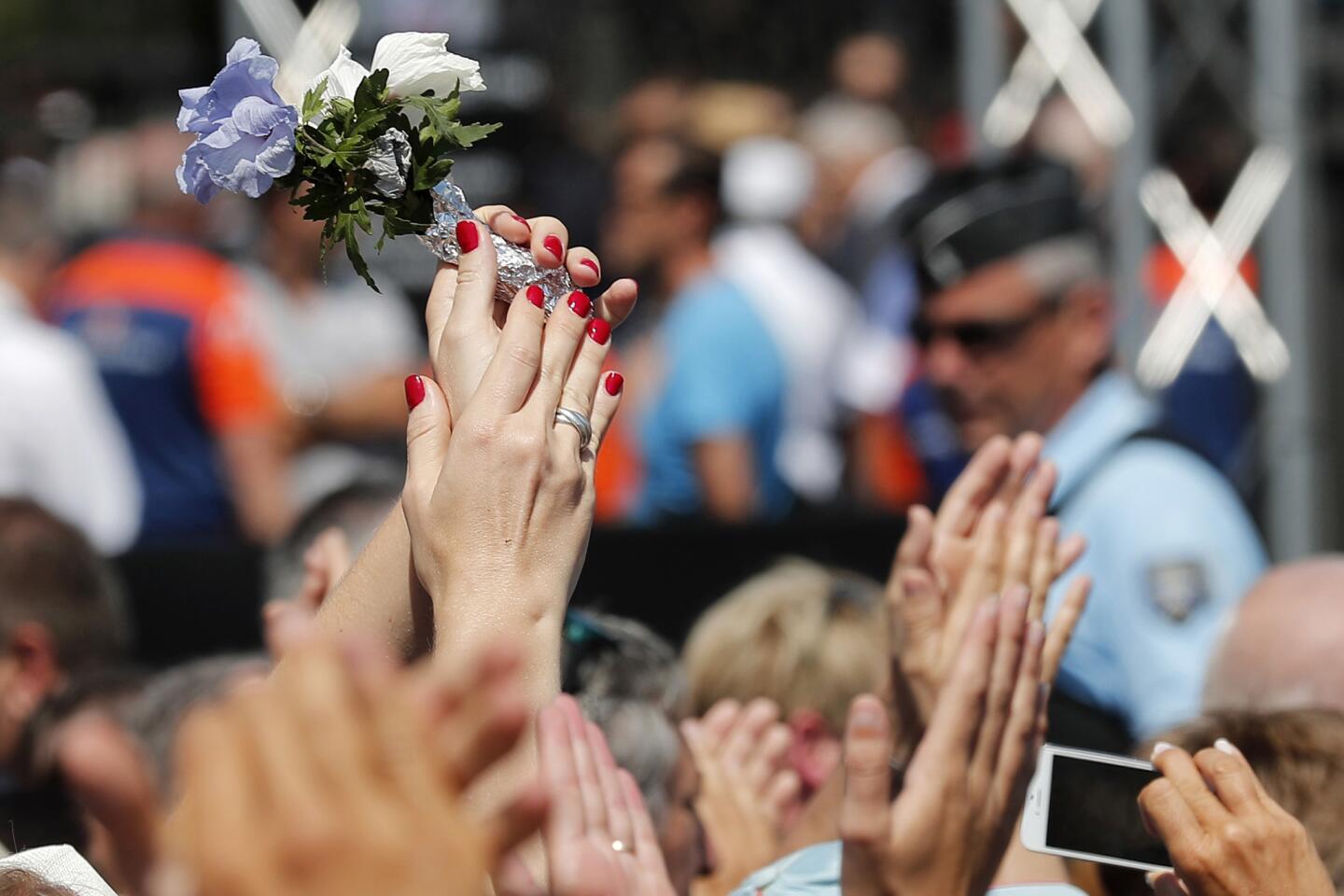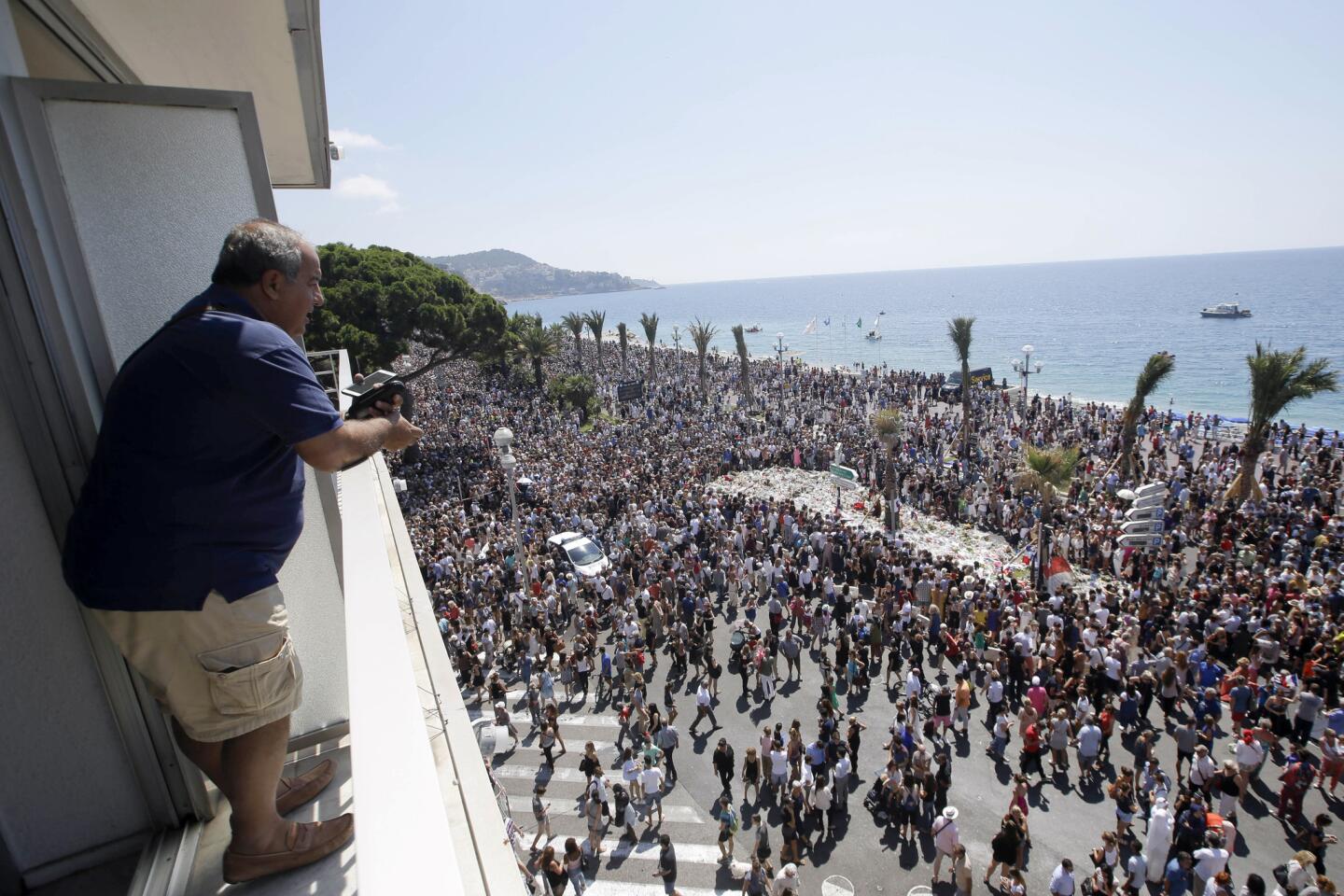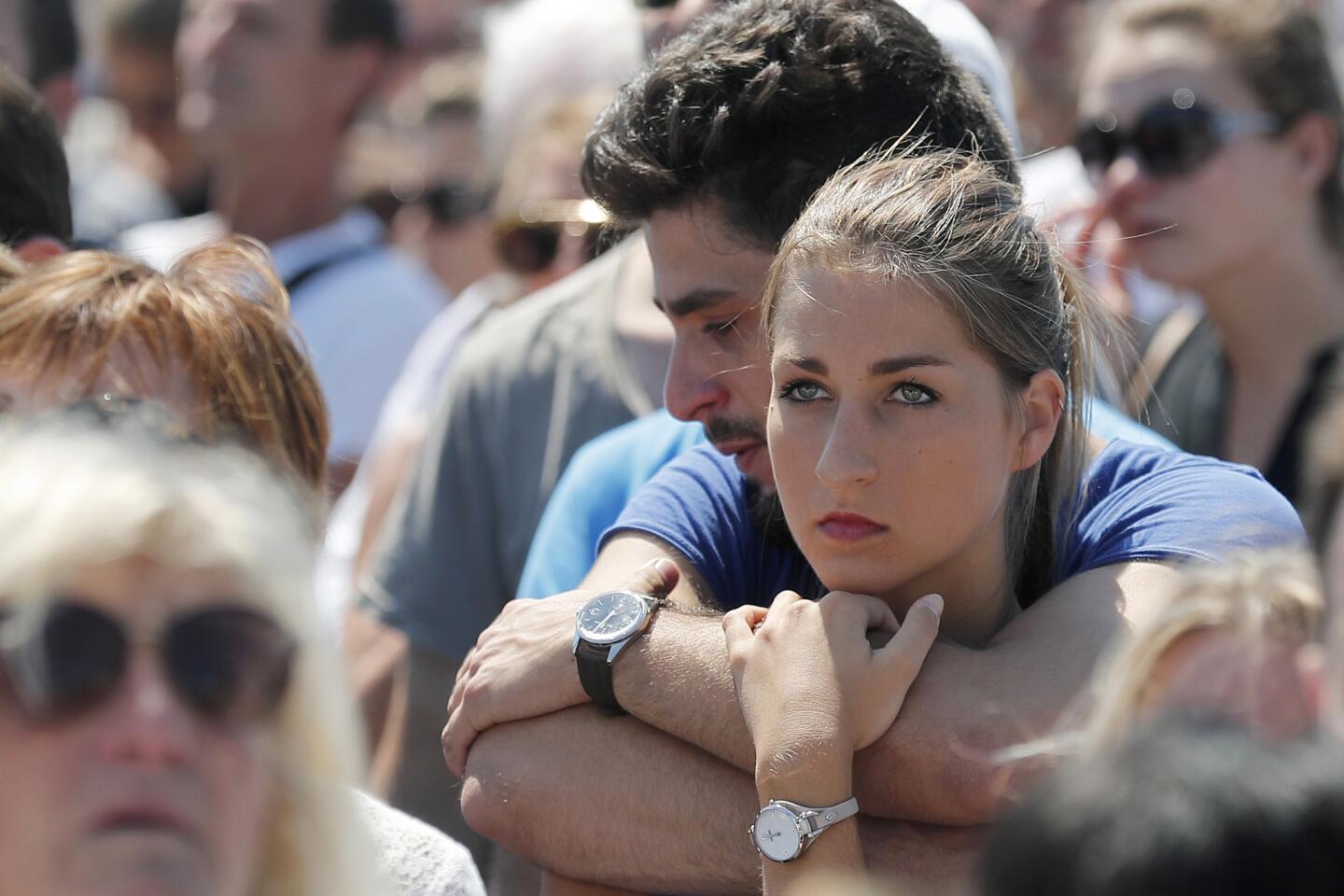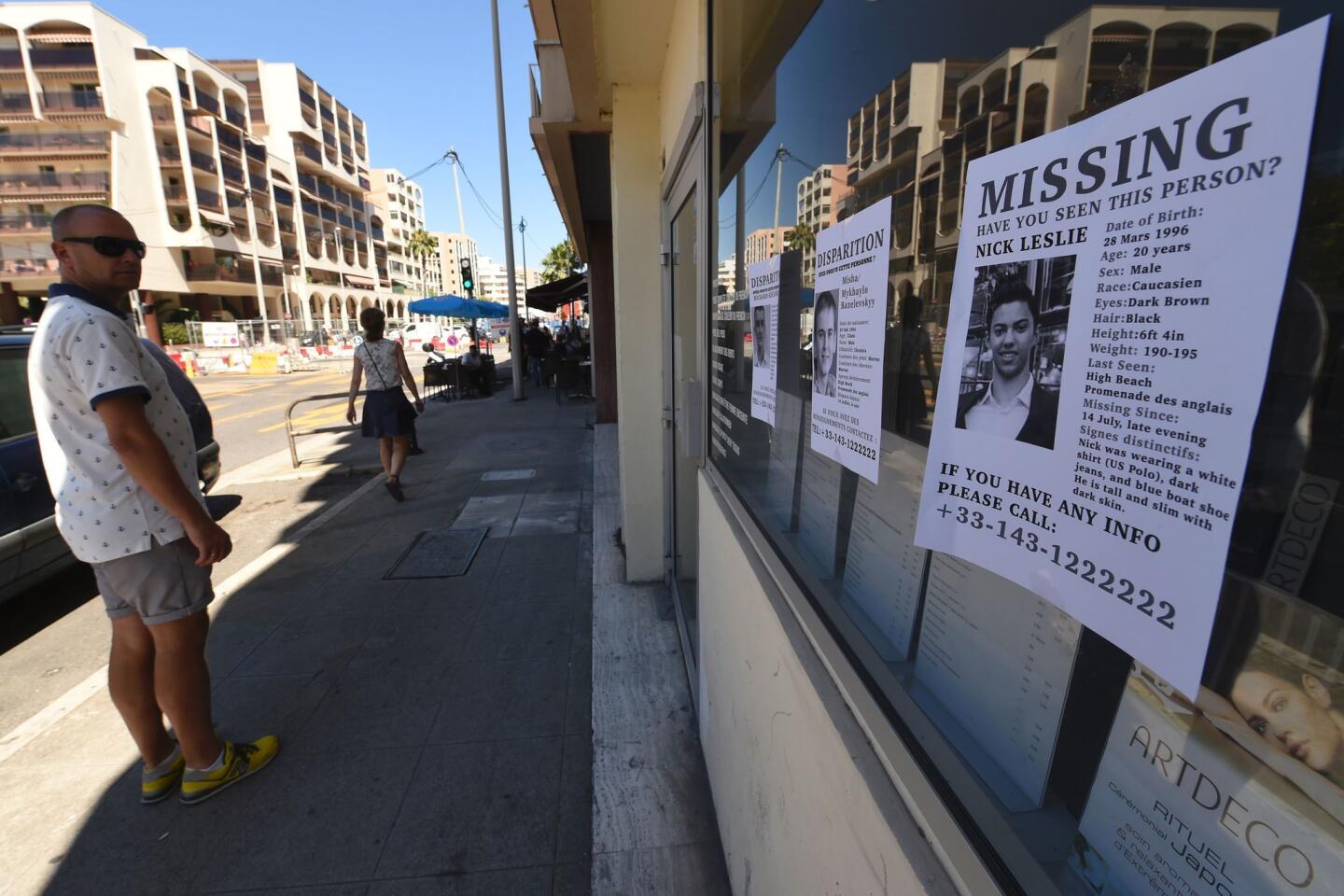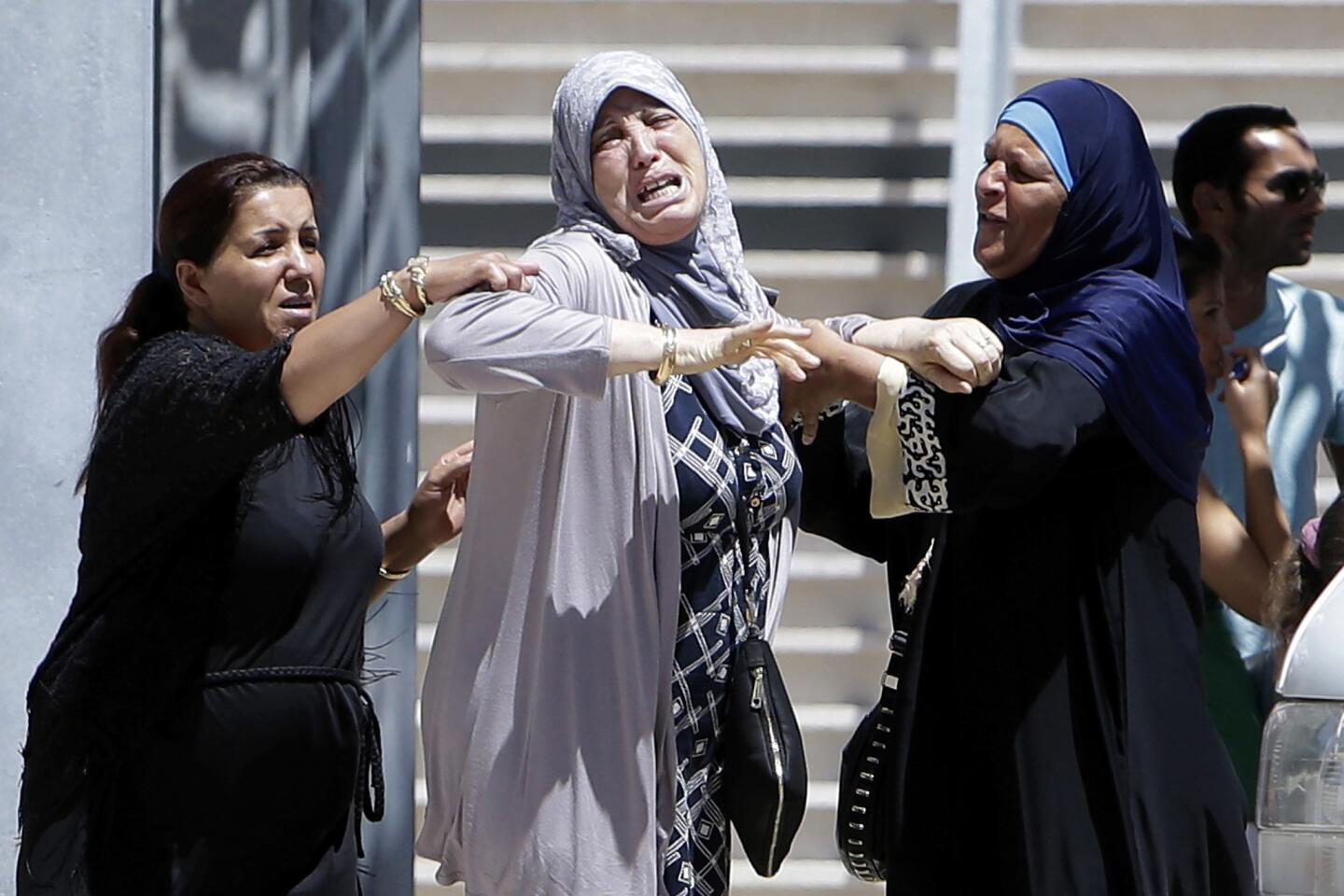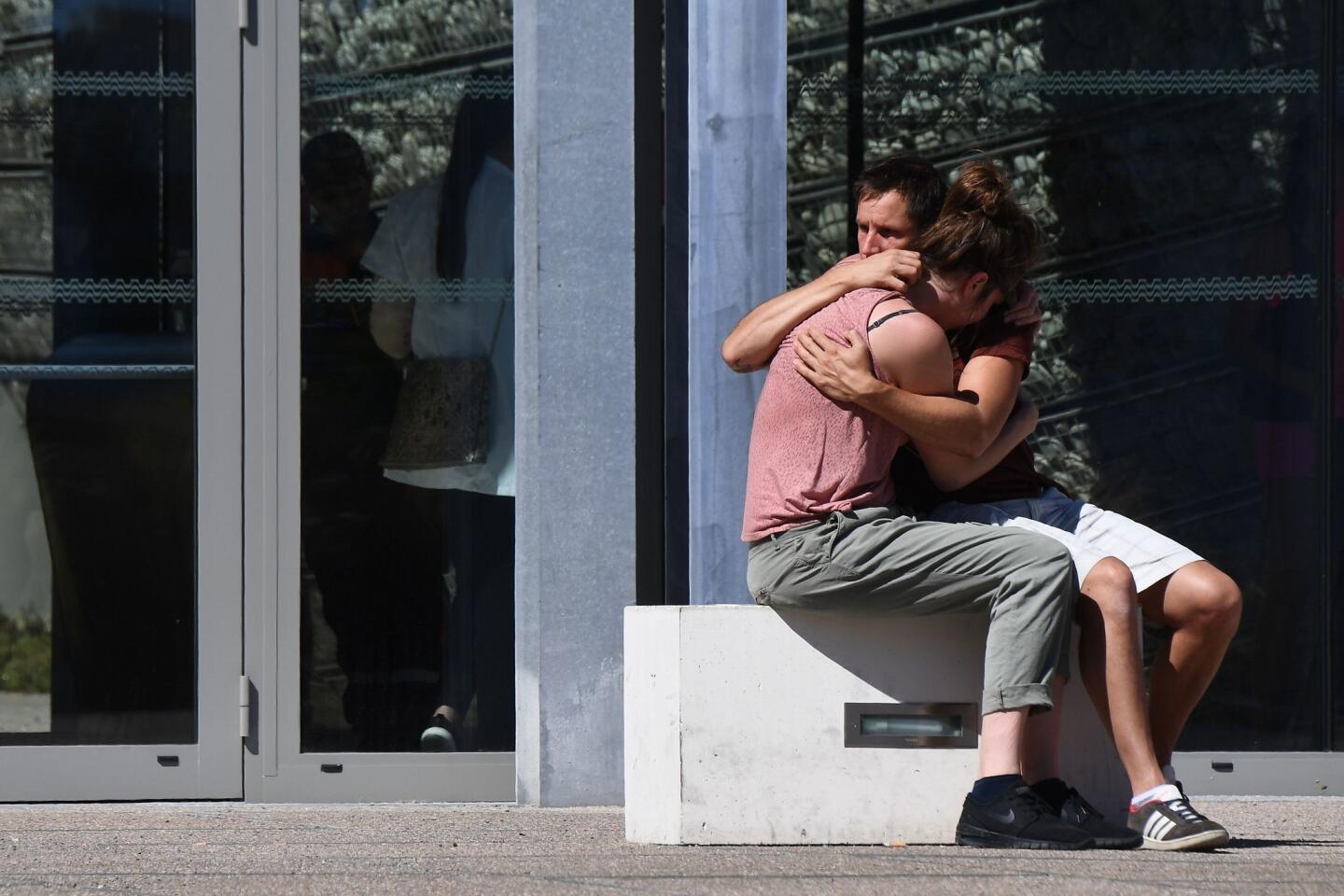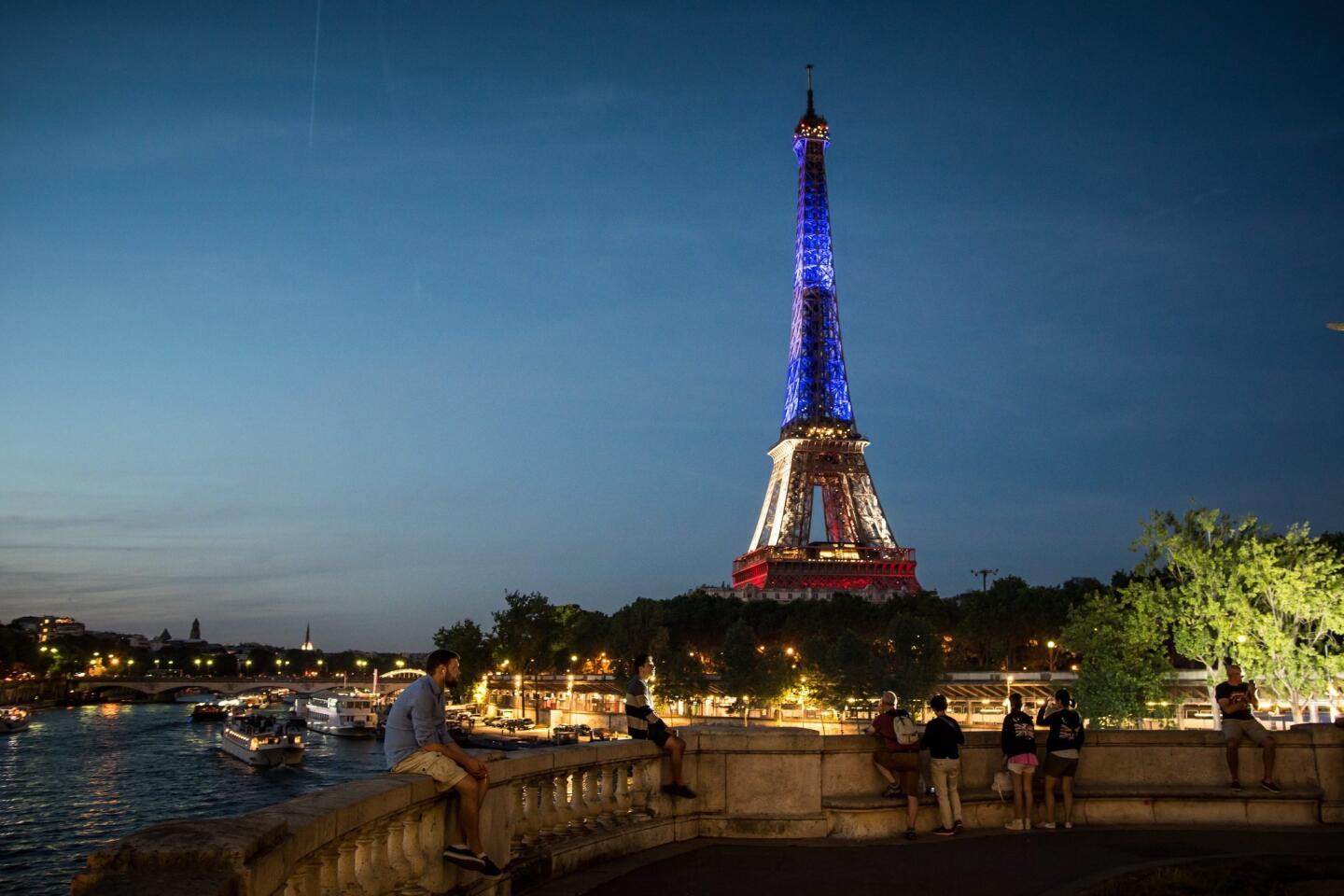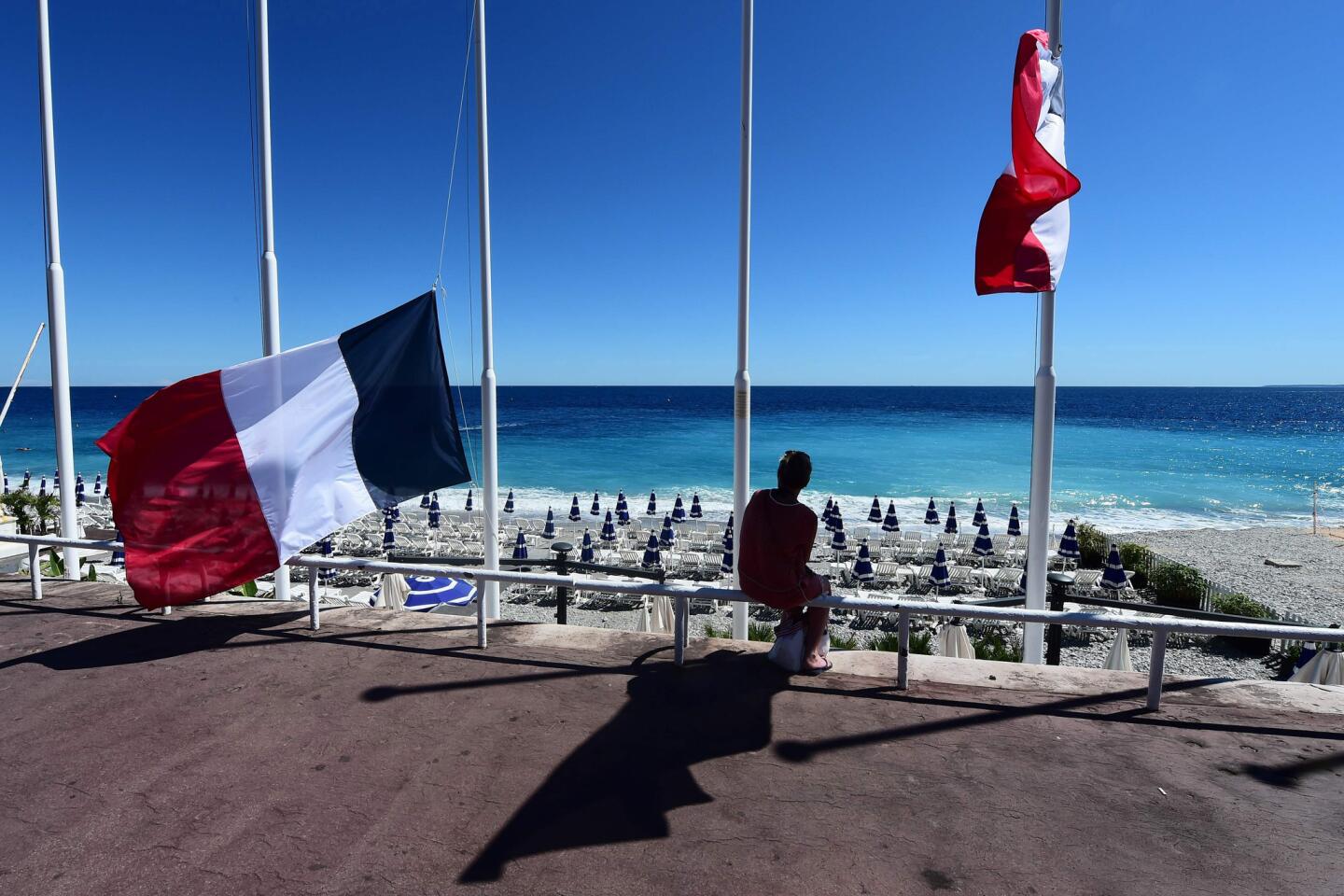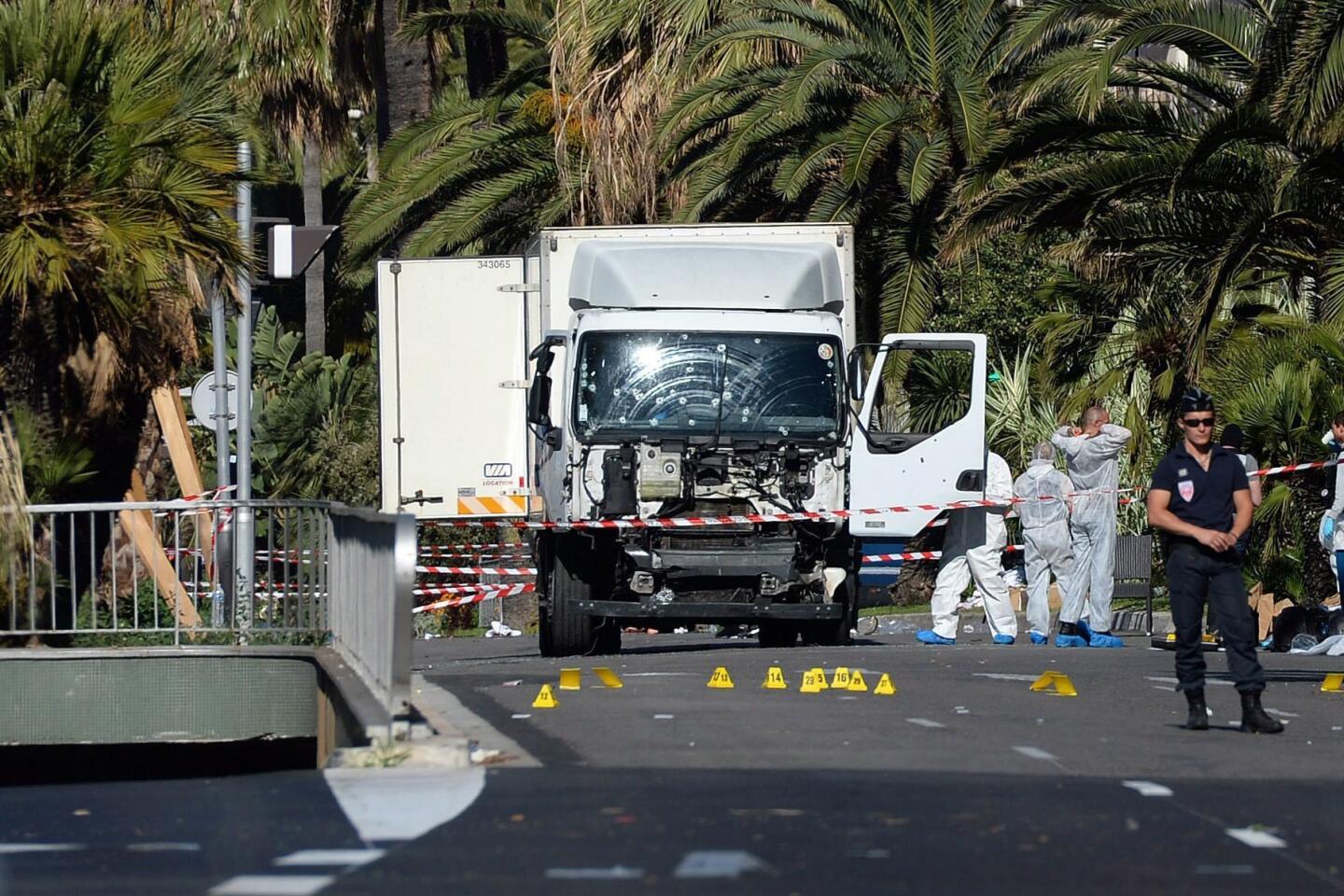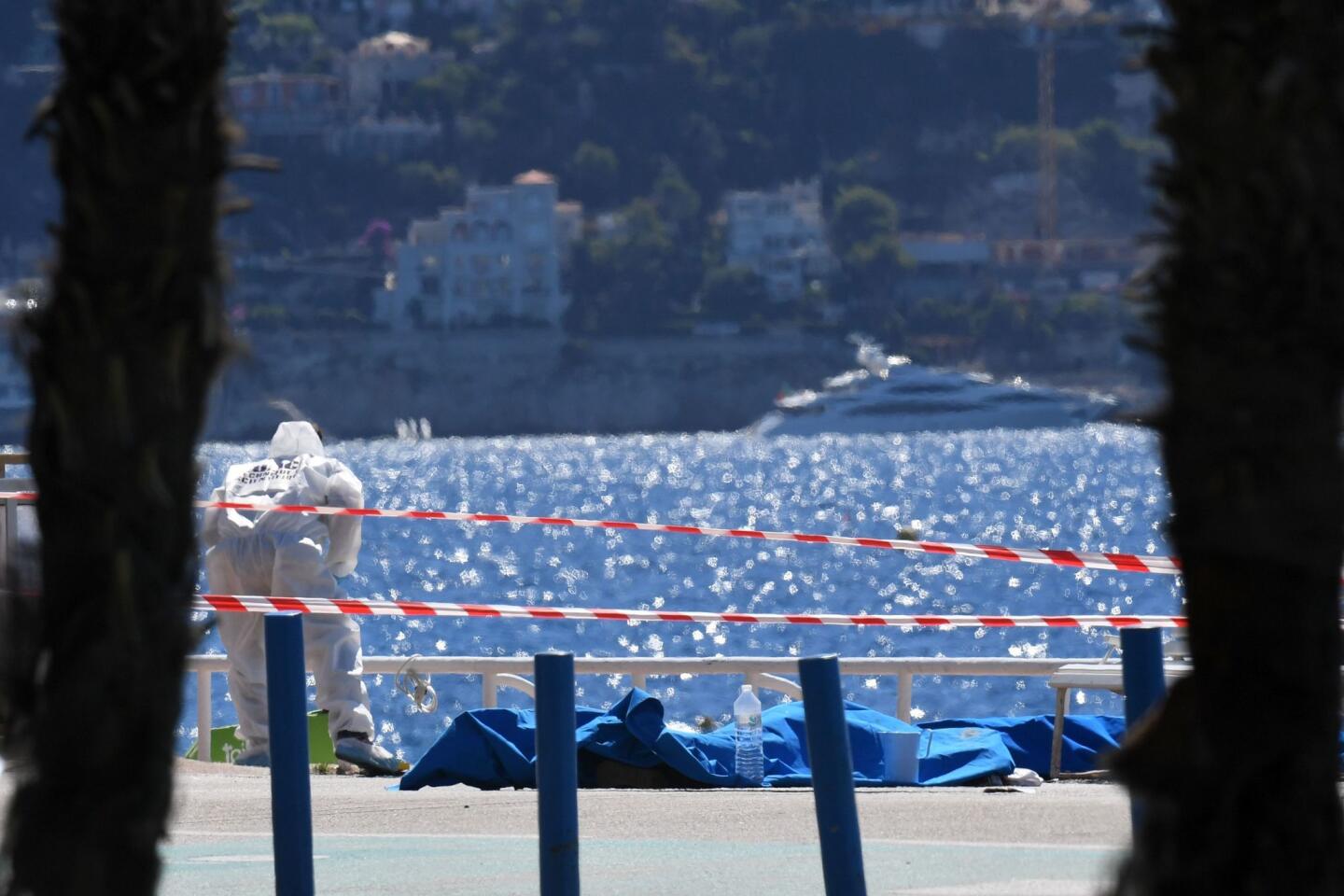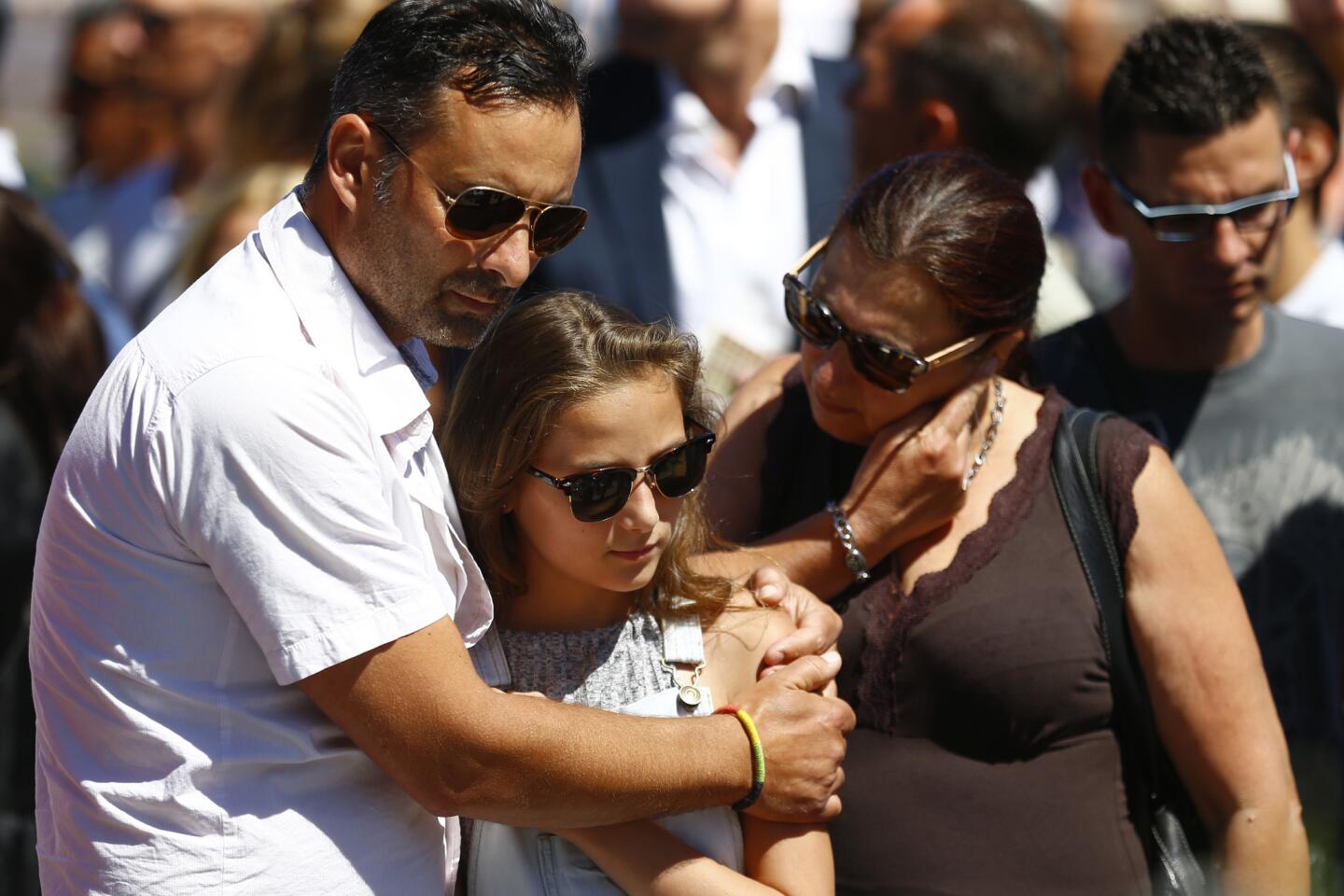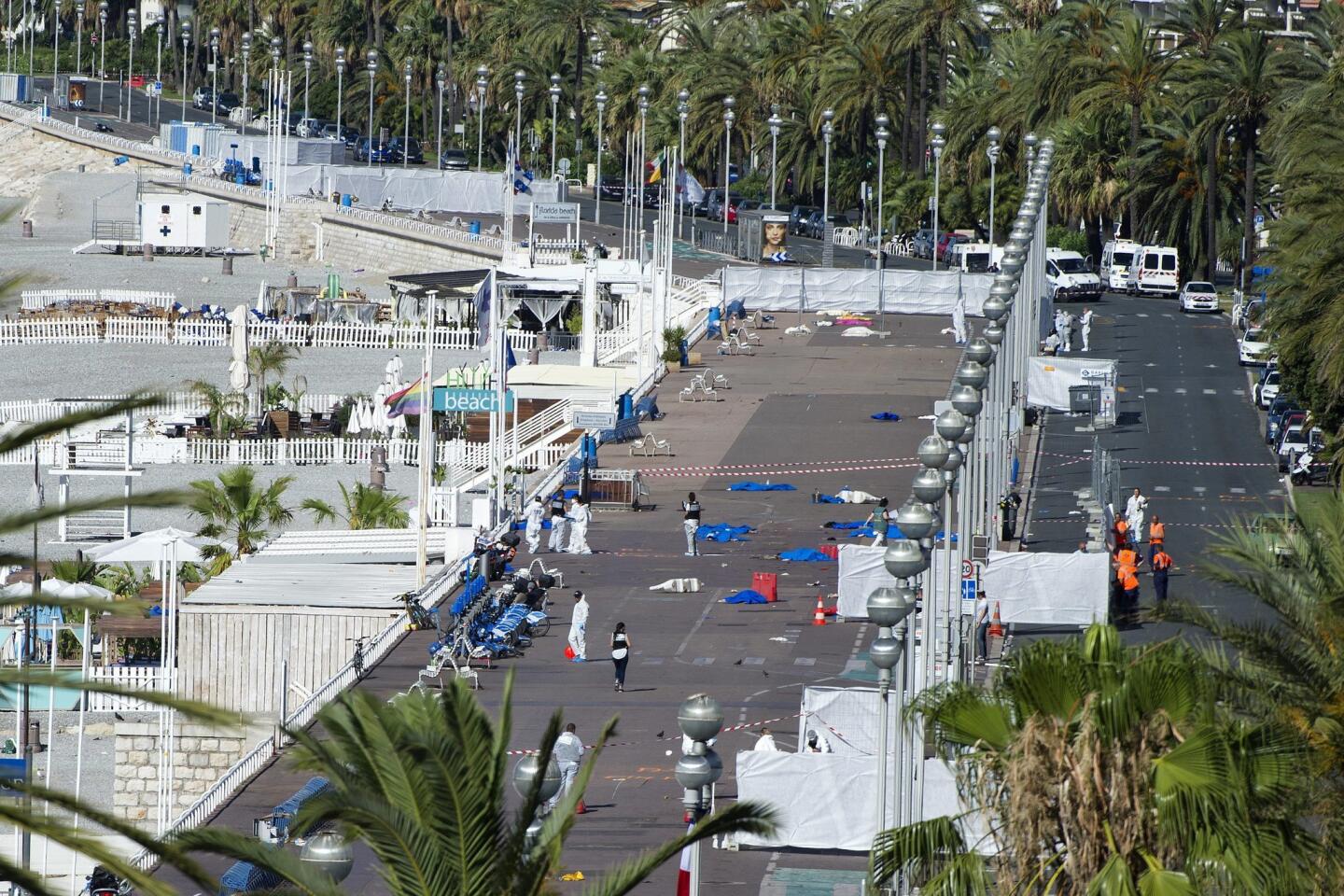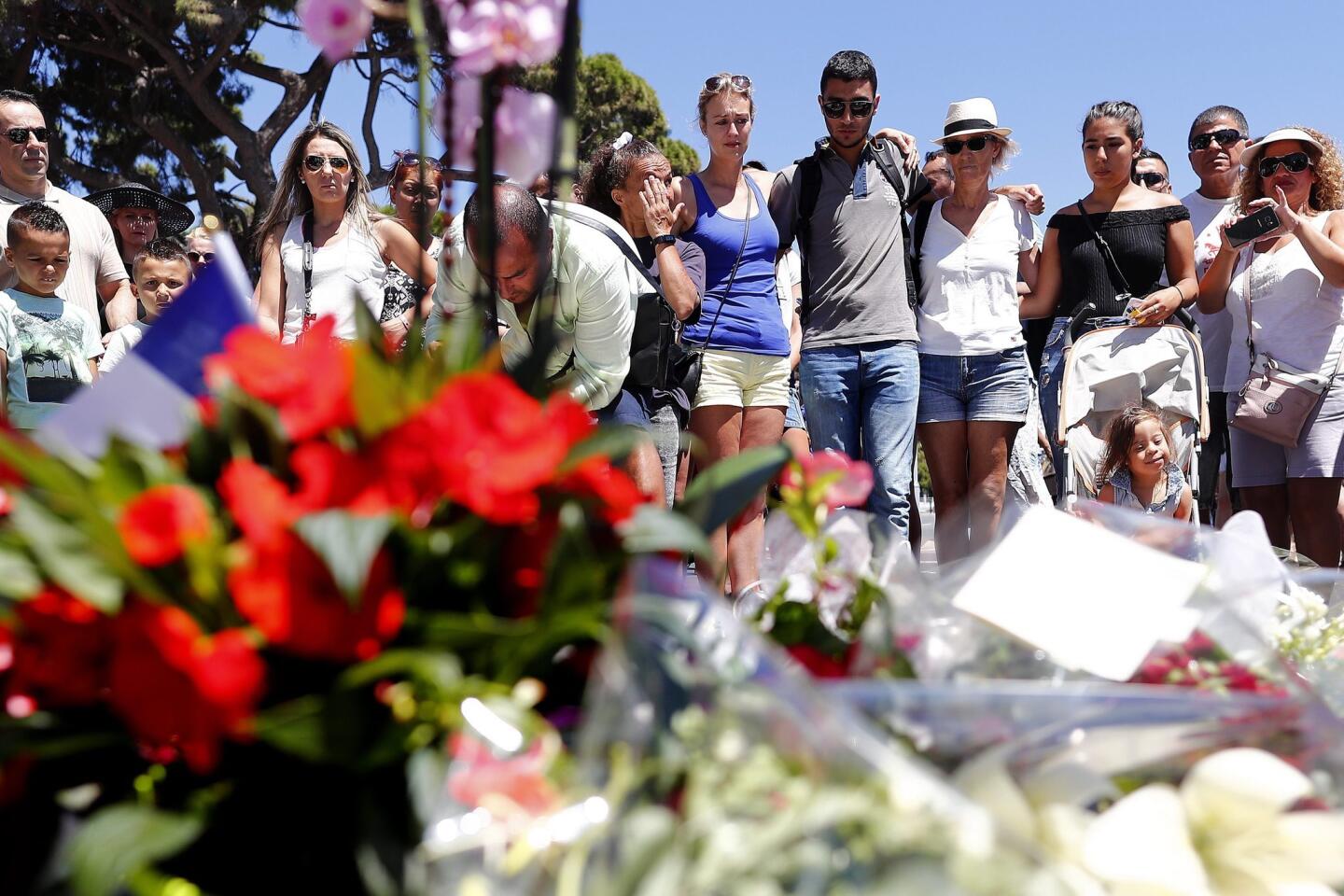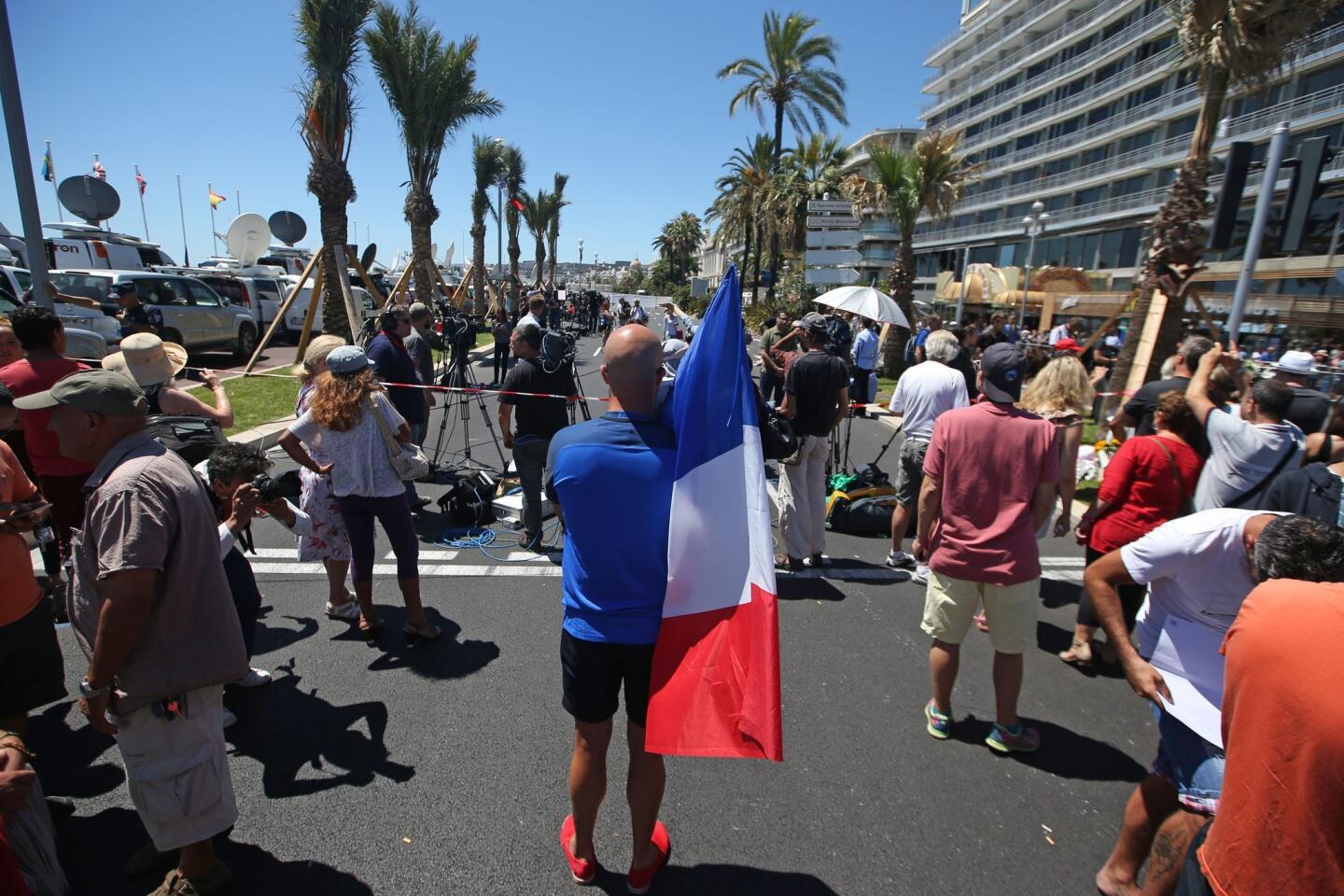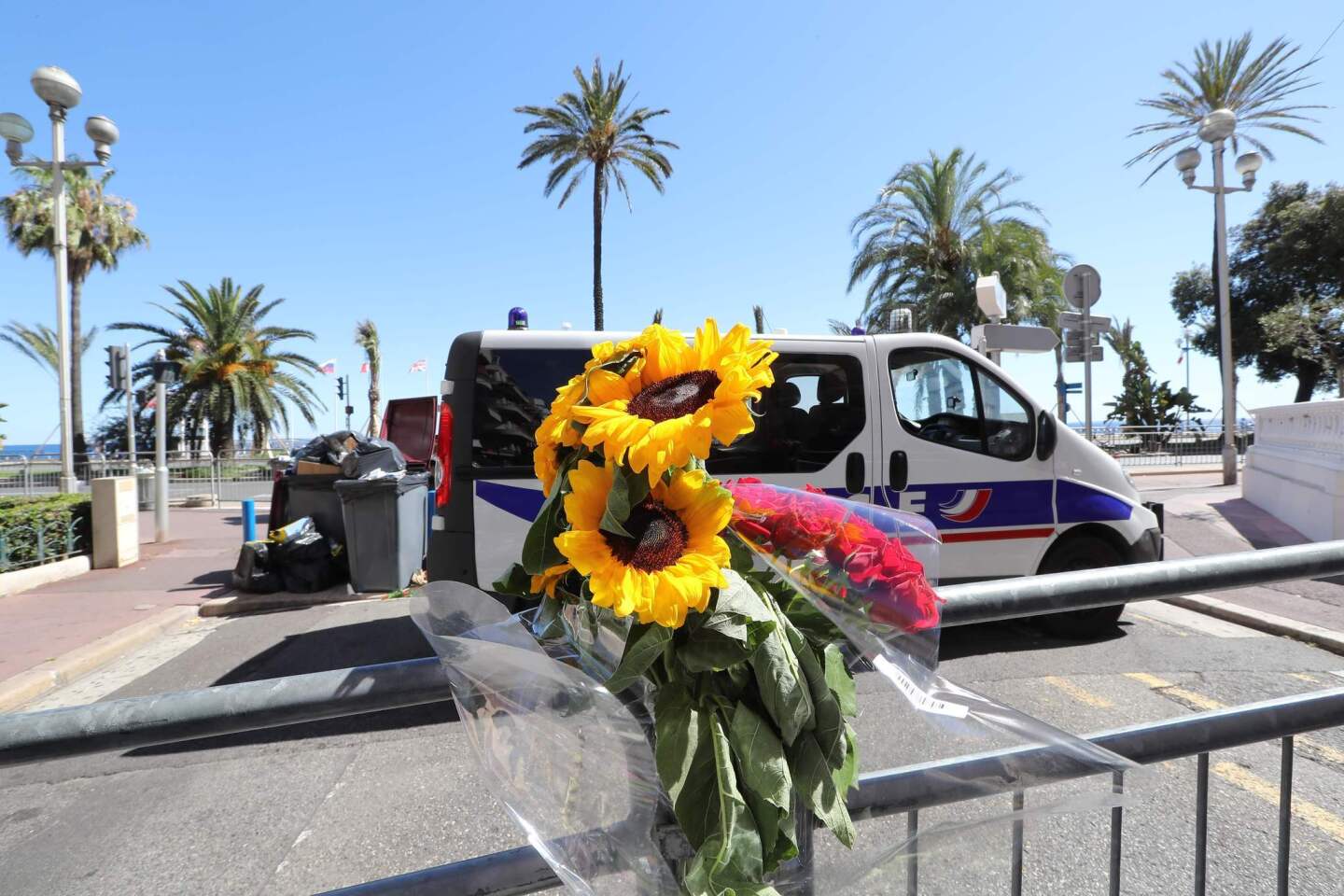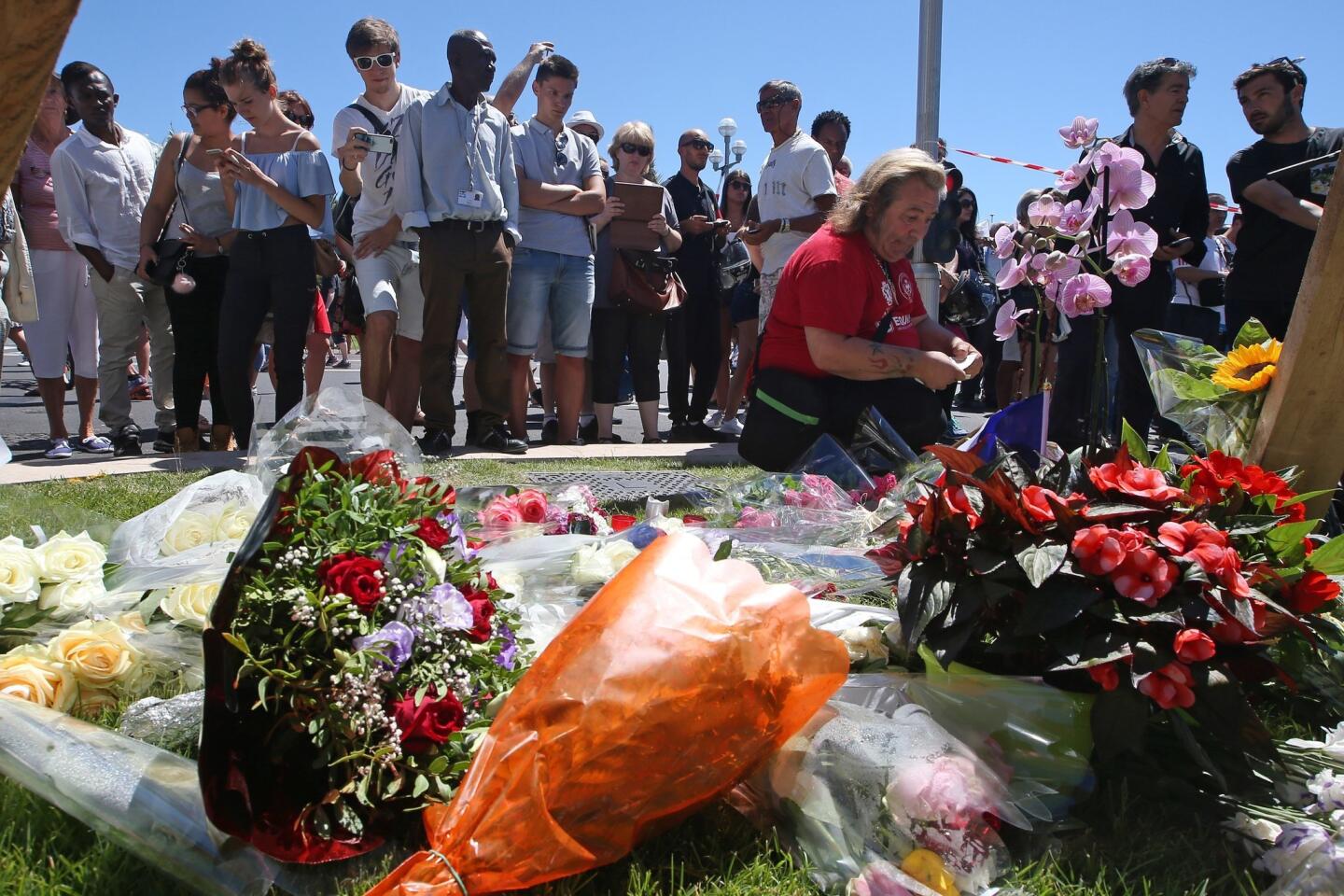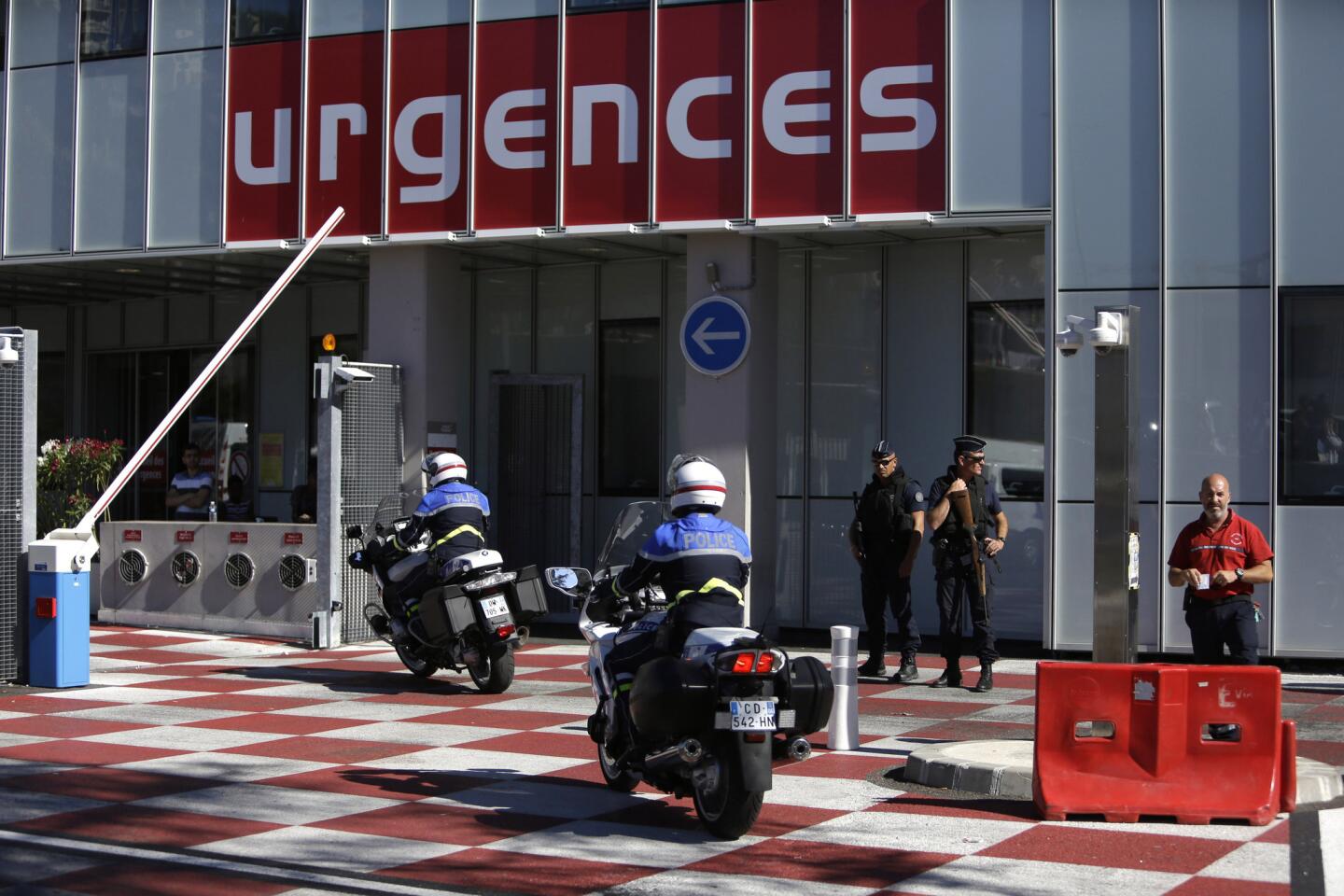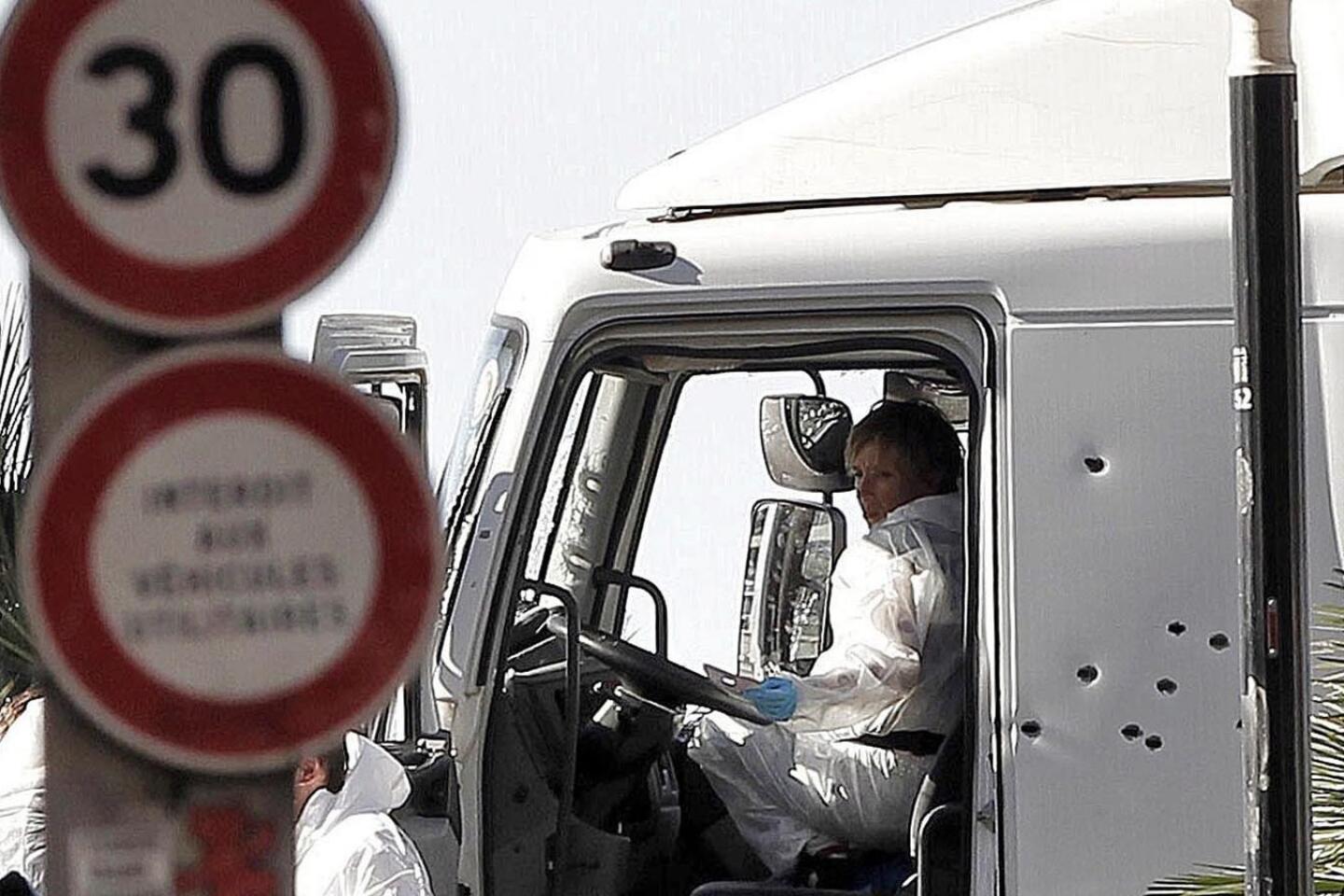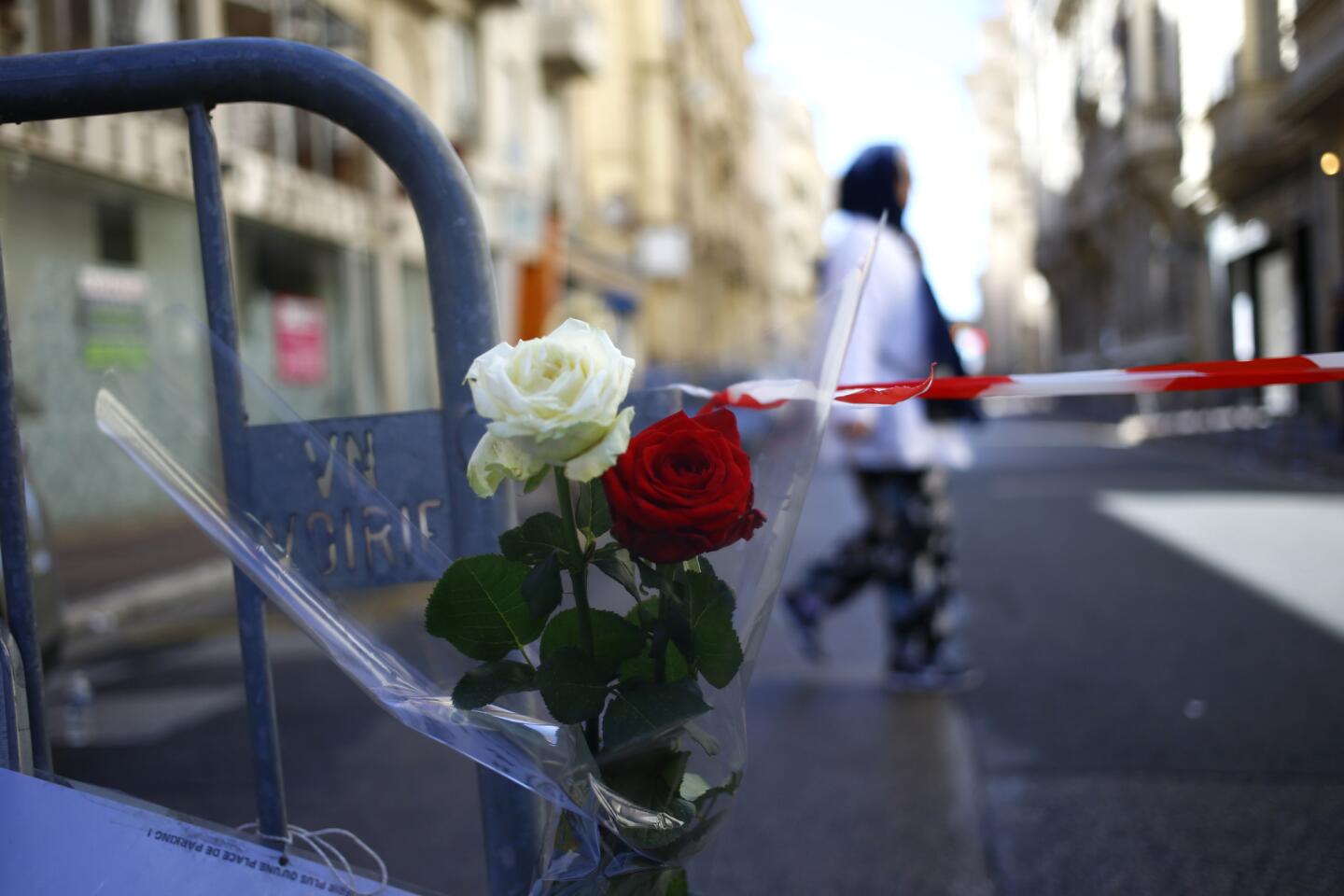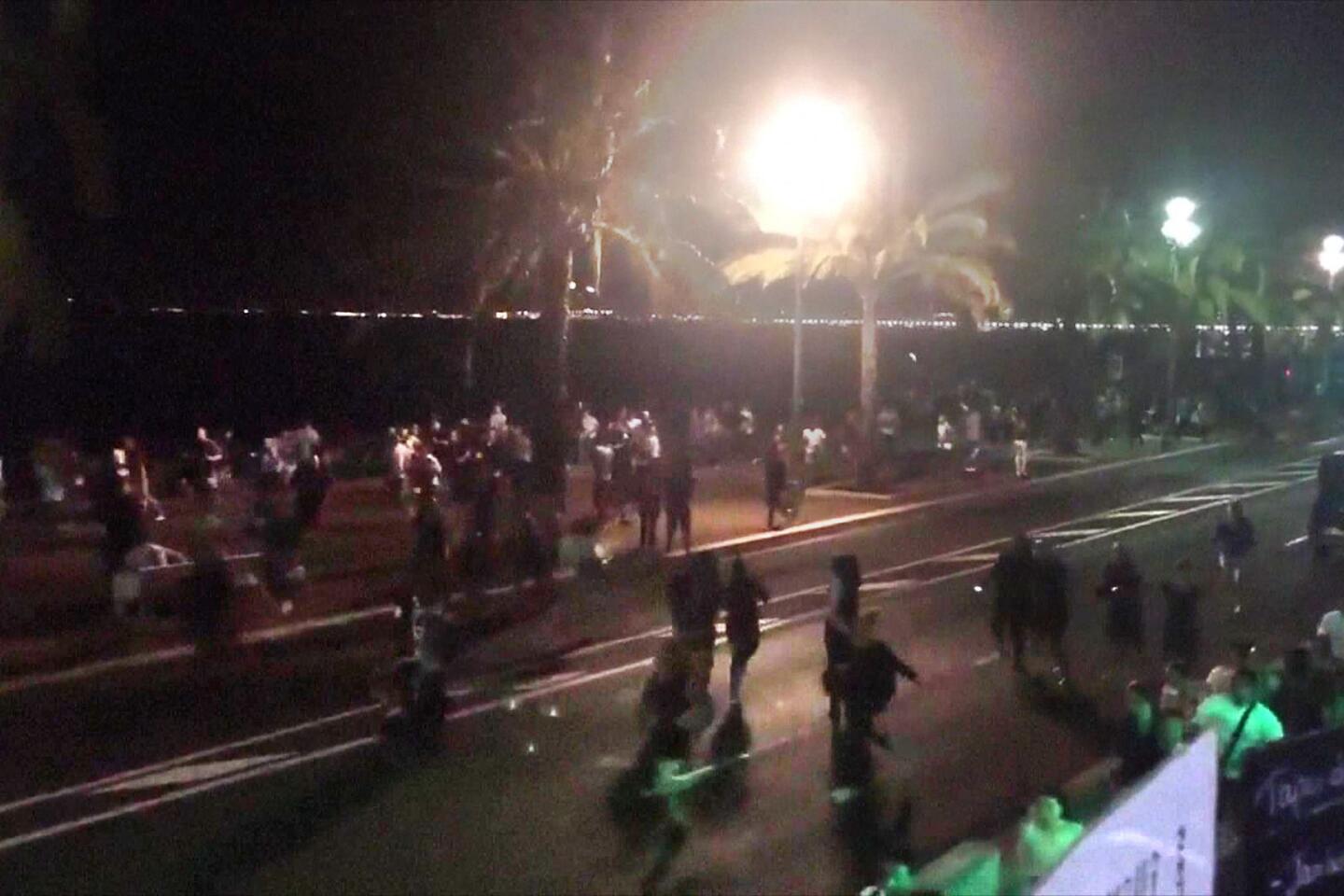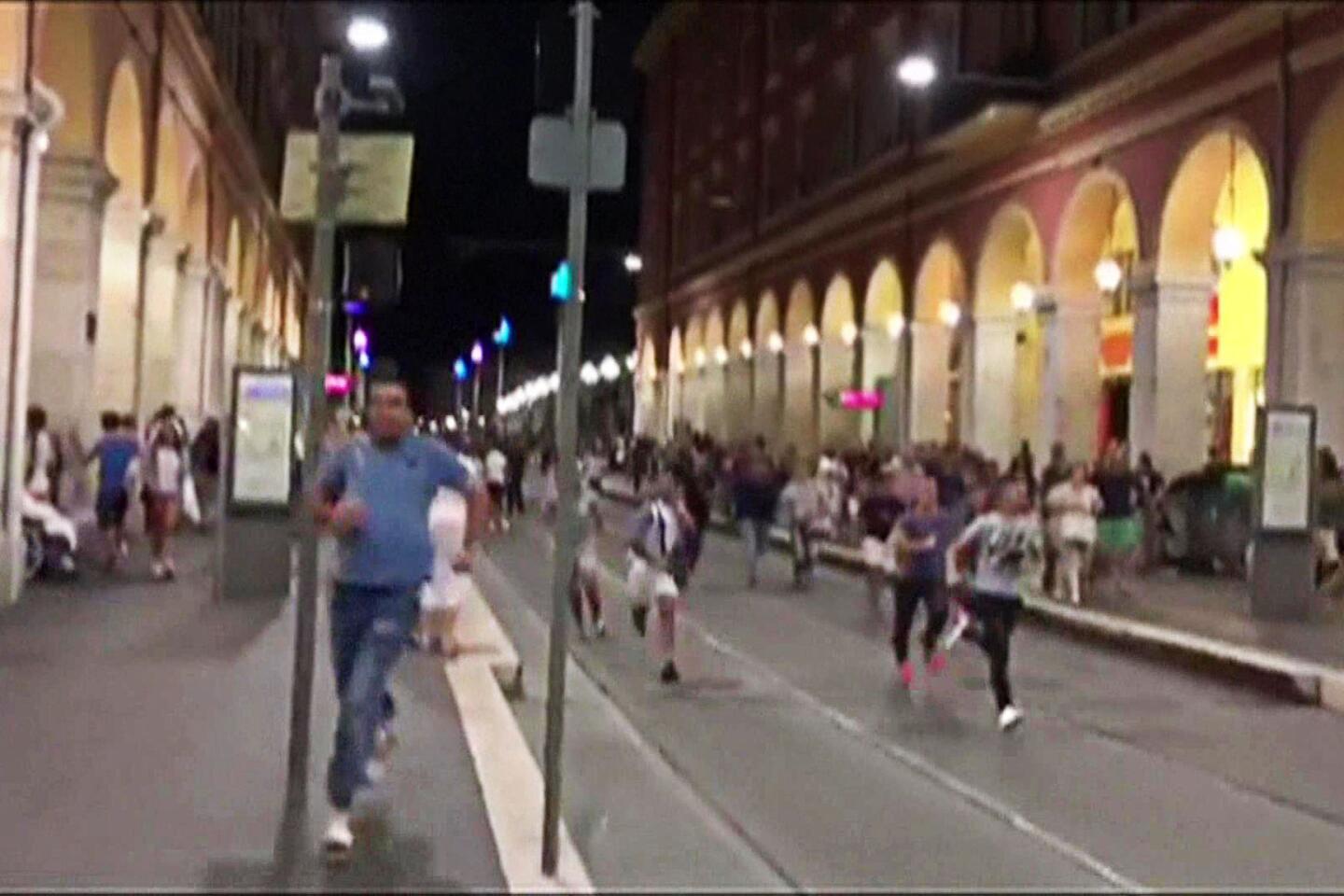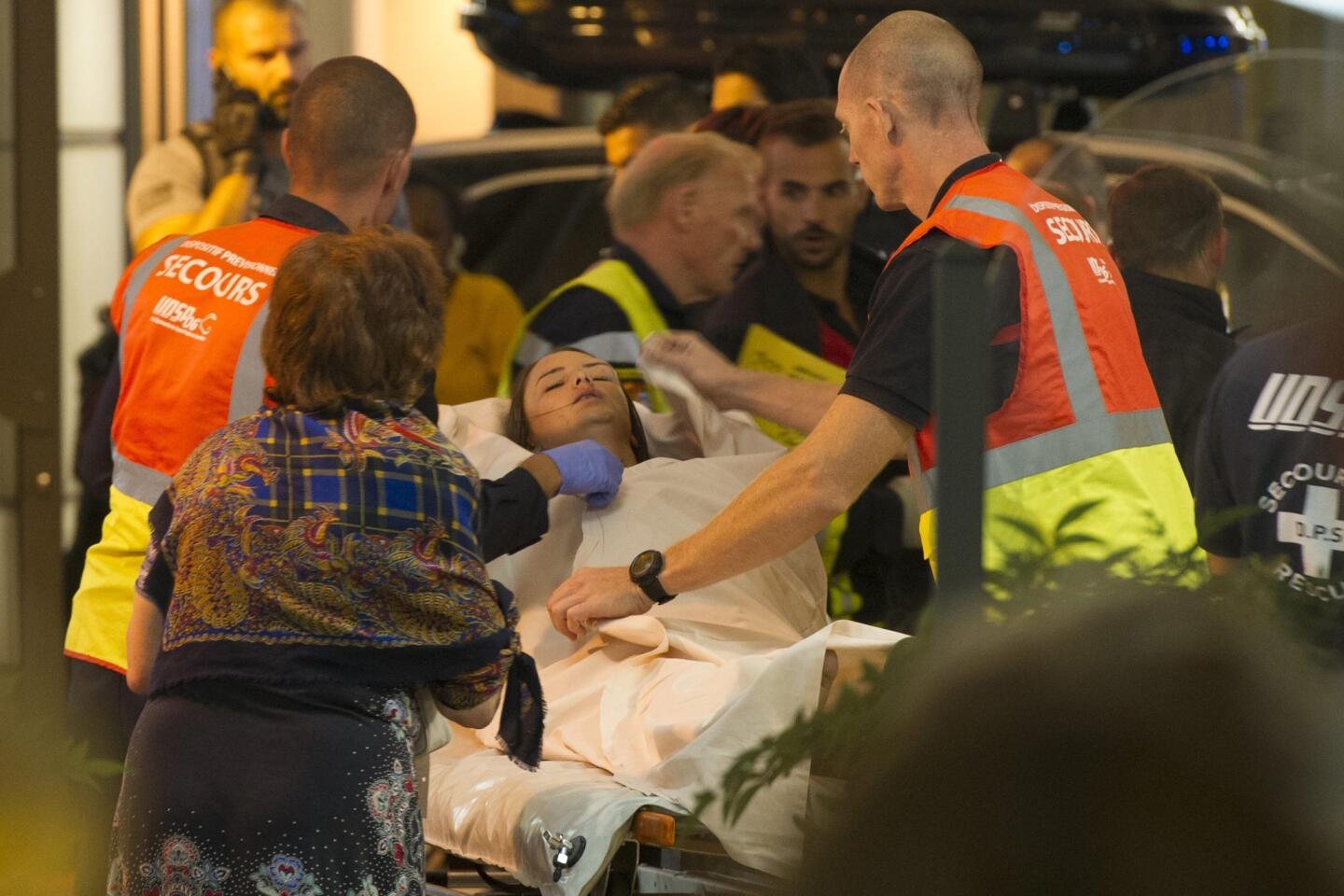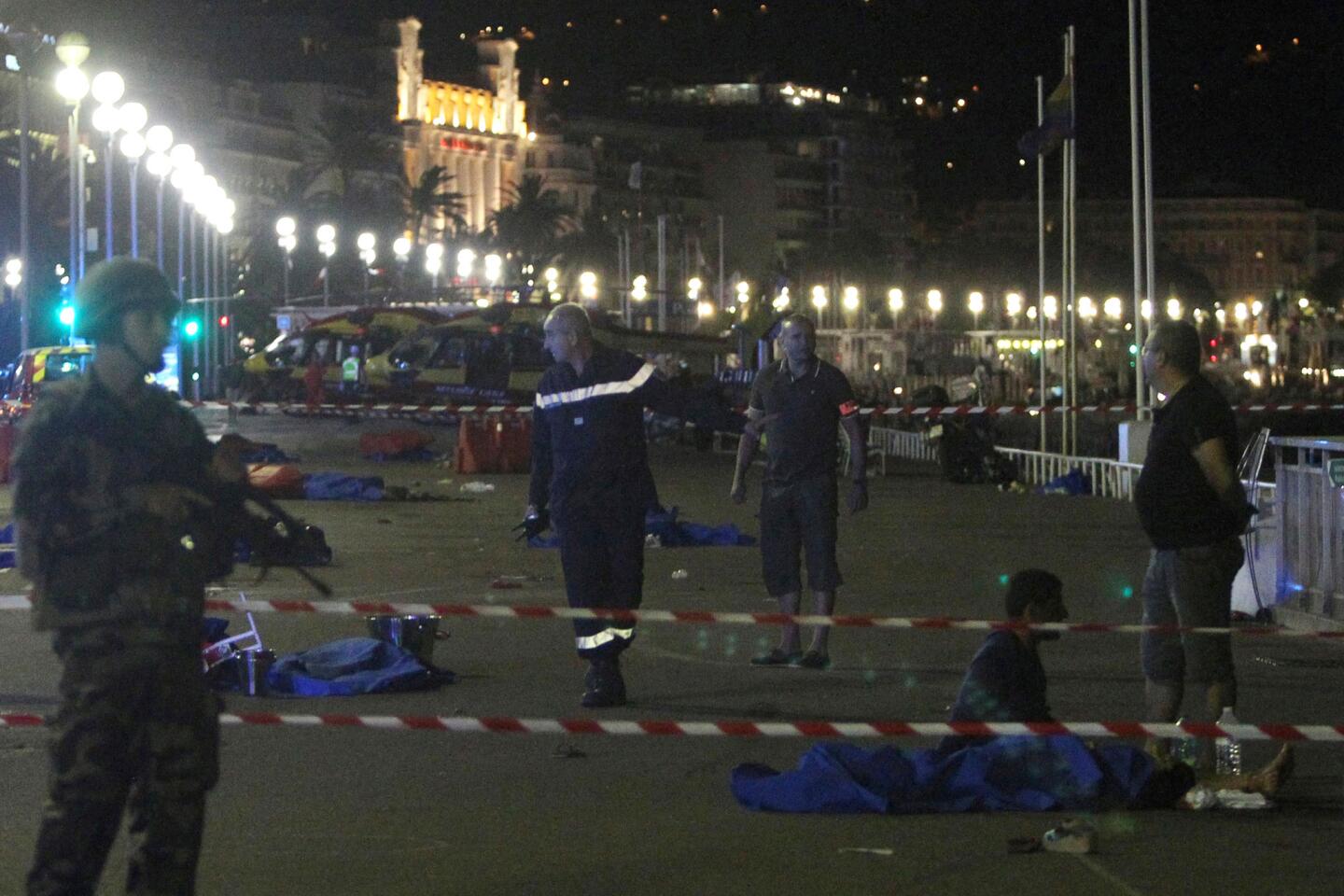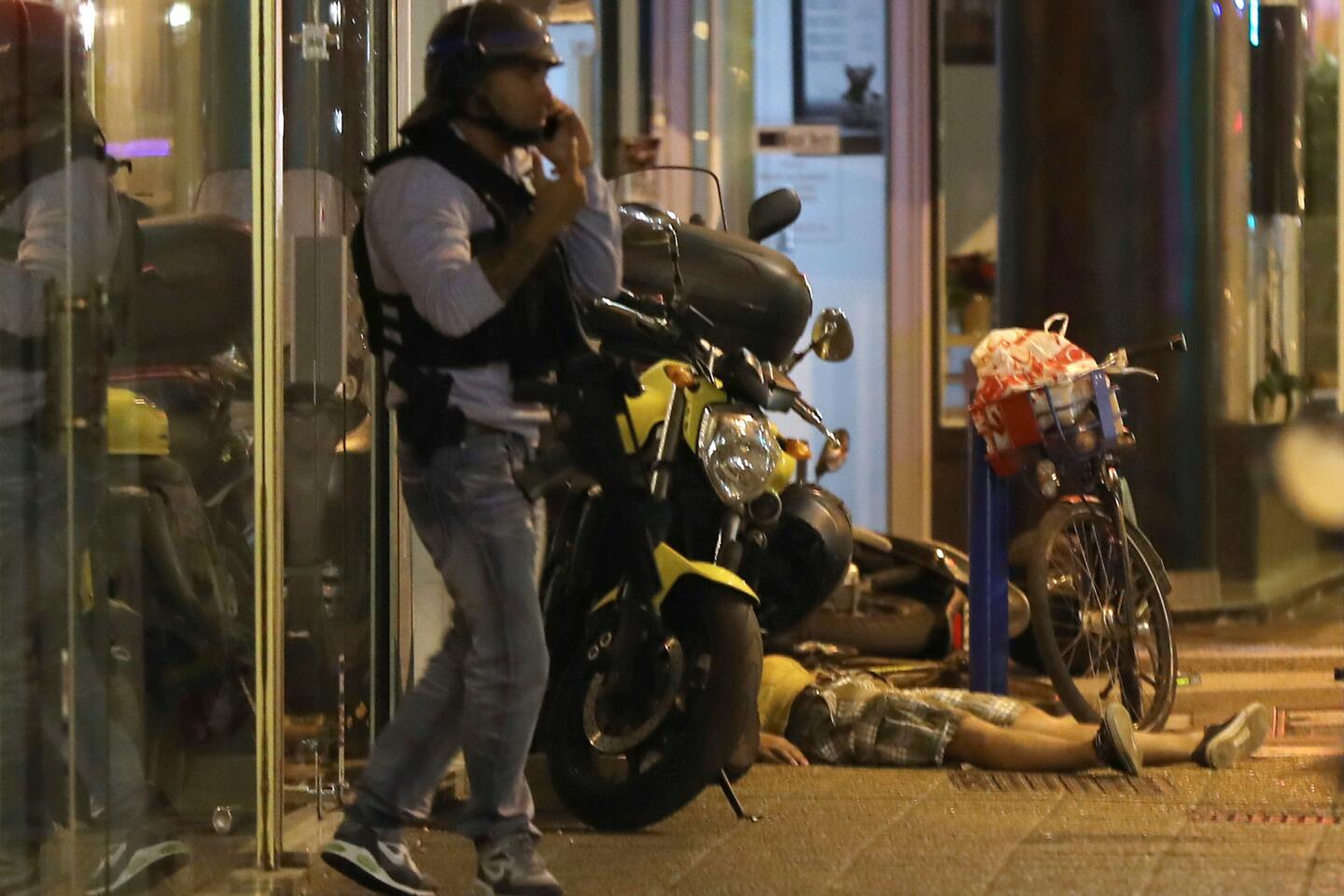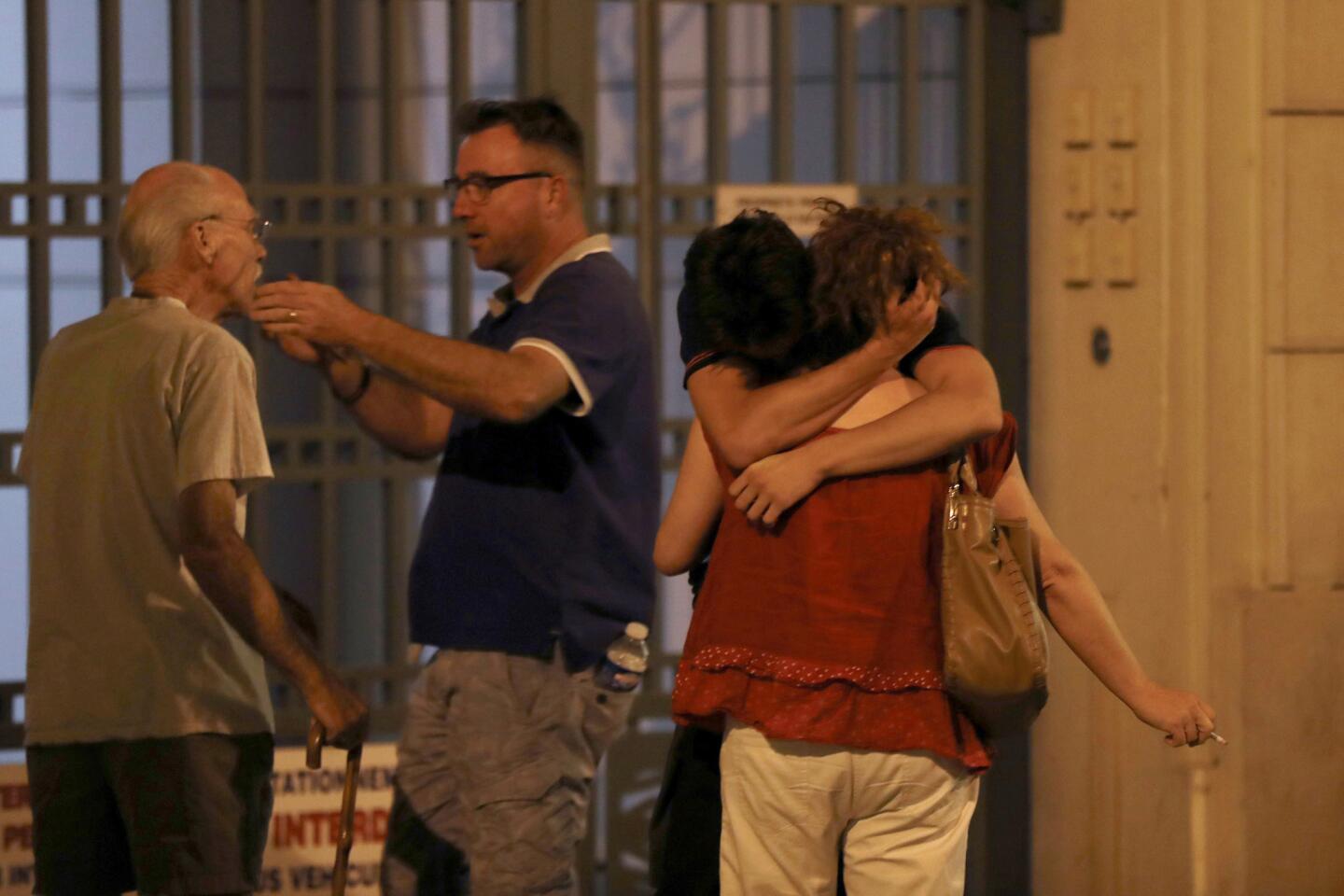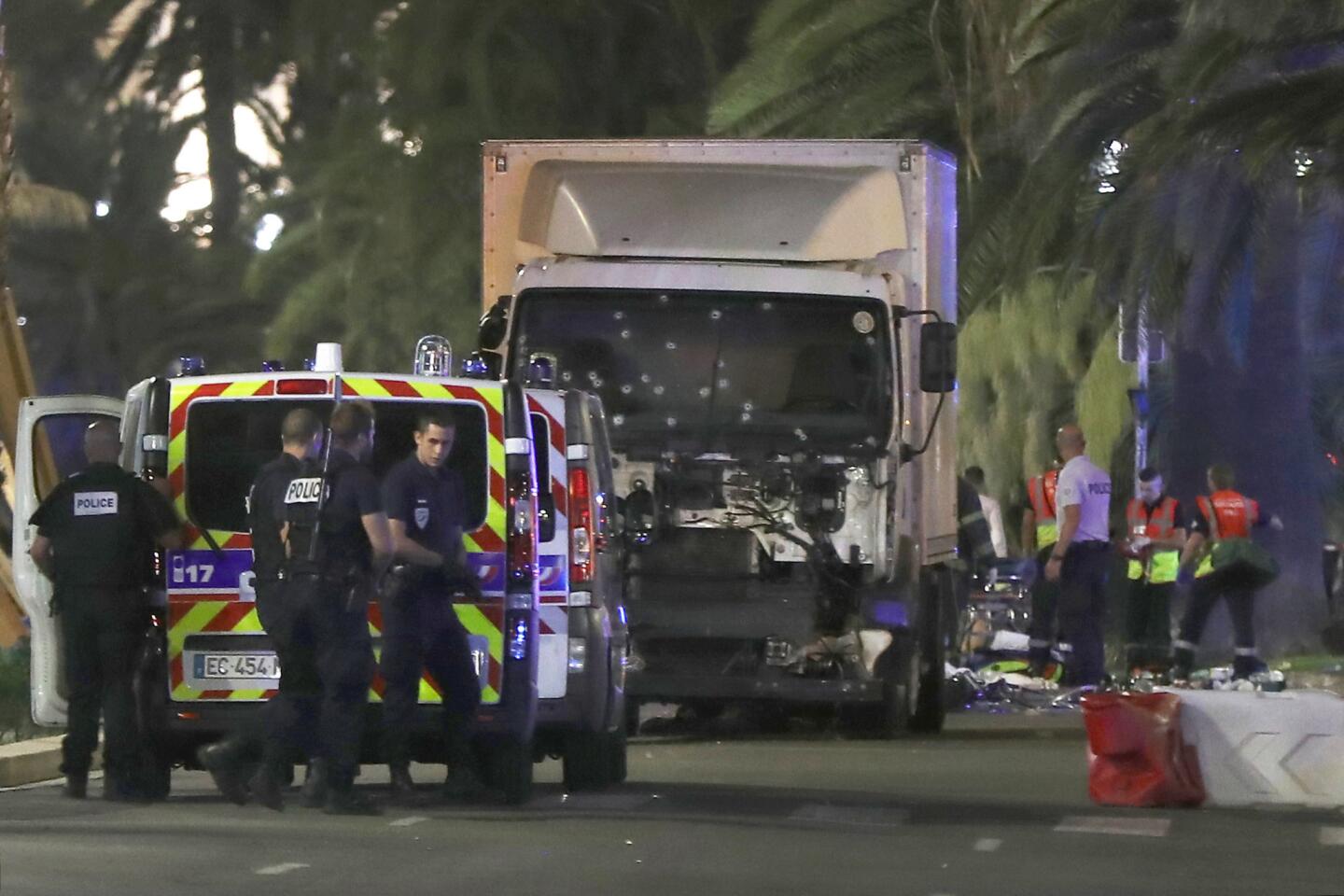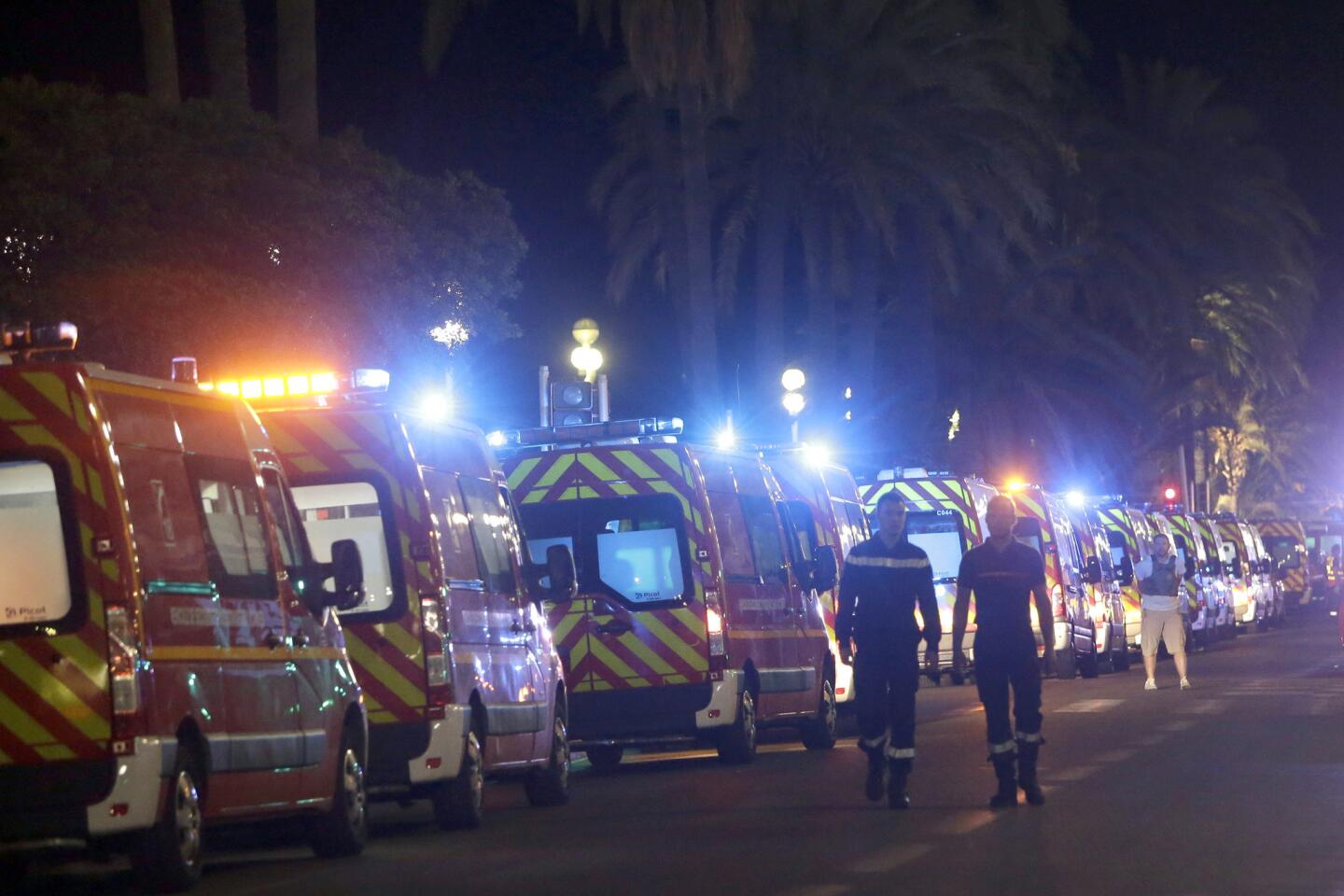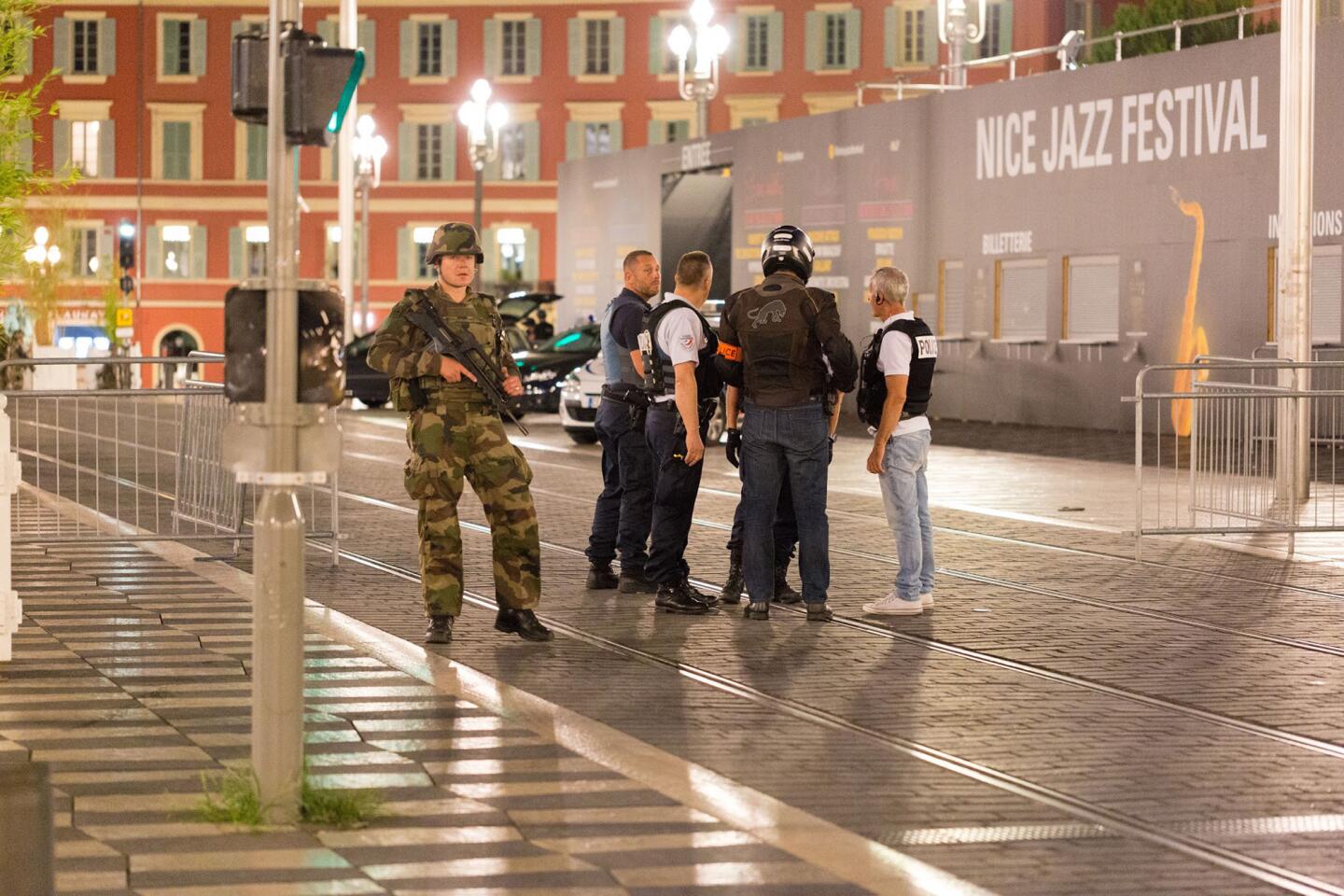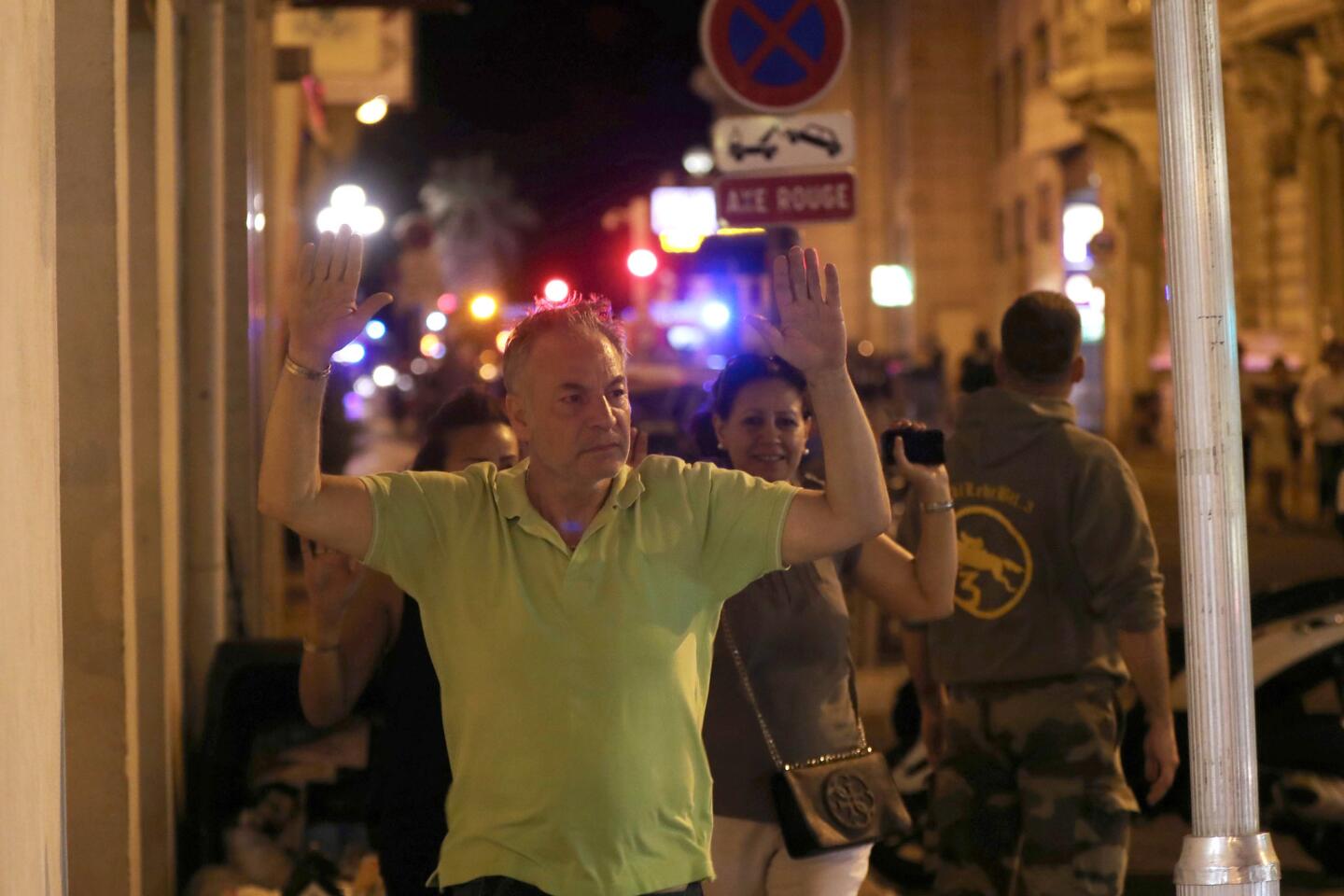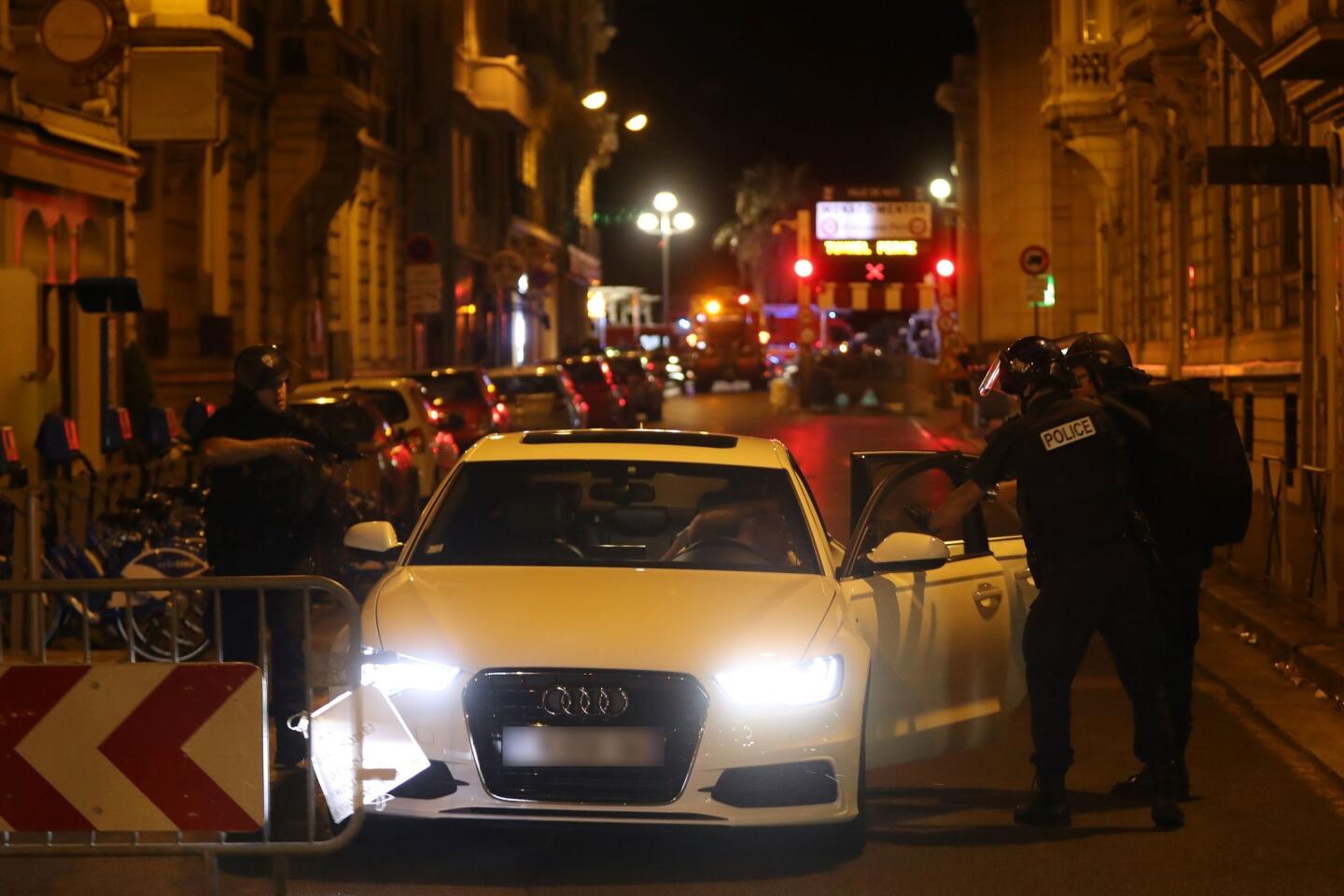After the Nice attack, an angry public wants to know: Why doesn’t the violence stop?
- Share via
Reporting from Nice, France — Public anger grew Saturday over the truck rampage that killed at least 84 people in this seaside resort, with accusations of lax security eroding support for the country’s already unpopular president and galvanizing passions over the threat posed by violent jihadists.
The carnage on France’s cherished national holiday – inflicted by an attacker initially described by authorities as a disaffected, violent petty criminal with no apparent ideological motive – fueled often raw debate over issues of national identity and the assimilation of immigrants. That echoed similarly volatile political discourse in the United States and elsewhere in Europe.
More than 24 hours after Tunisian-born deliveryman Mohamed Lahouaiej Bouhlel barreled a 19-ton truck through a celebratory crowd in this Riviera resort city, the extremist group Islamic State issued a claim, albeit an indirect one, of responsibility for the attack.
In a statement, the affiliated Amaq news agency cited a “security source” within the radical group as saying the attack was carried out by “one of the soldiers of the Islamic State.”
Two years of terror: 278 people have died in recent terror attacks in Europe »
While the claim appeared to many experts to be little more than an opportunistic bid to capitalize on worldwide publicity accompanying the third major strike on French soil in the past year and a half, it coincided with France’s interior minister, Bernard Cazeneuve, positing for the first time that Bouhlel may have been quickly “radicalized” prior to the attack.
France’s defense minister, Jean-Yves Le Drian, cast blame on Islamic State for its relentless cheerleadering of lone-wolf, low-tech strikes against Western targets – much like the one in Nice, which the Amaq statement, in brutally flat language, termed a “running-over operation.”
With elections to take place next year, President Francois Hollande’s critics within his own center-left Socialist Party, from the opposition Republicans and from the far-right National Front, stepped up their denunciations.
In the wake of Thursday’s gruesome events, Marine Le Pen, head of the National Front, took to social media on Saturday to call on Cazeneuve to resign.
Condemnation also came from center-right politician Alain Juppe, another likely challenger to Hollande in elections expected to take place next spring.
“If everything that needed to be done had been done, this tragedy wouldn’t have happened,” Juppe, the mayor of Bordeaux, told French radio.
In Nice, still packed with vacationers despite the attack, the day brought more faltering steps toward normalcy, with the broad waterfront promenade where the carnage took place reopening to the public.
But wrenching signs remained, with some frantic families still searching for missing loved ones, and many victims still hospitalized, dozens of them gravely injured.
An enormous heap of flowers, some adorned with notes and messages, lay on a traffic divider on the promenade.
Elsewhere, riders in the Tour de France, the celebrated bicycle race, took off their helmets and observed a moment of silence for the victims before embarking on Saturday’s route, and the Eiffel Tower was lit Friday night with the tricolors in a symbol of solidarity.
But amid the outpouring of sympathy, some in Nice voiced the view that the huge holiday gathering on the Promenade des Anglais had been too lightly guarded for such a tempting target, particularly in light of the devastating attacks in Paris only eight months earlier. Hollande had been booed by some residents on Friday when he came to Nice to express condolences and visit hospitalized victims.
In a sharply worded letter published on the website of the Nice Matin newspaper, the regional council president, Christian Estrosi, said he had called for a stepped-up police presence in advance of the Bastille Day celebrations, but to no avail. Estrosi, a Republican, characterized the current administration as inept.
“I can’t disguise my deep anger over this,” he said. “How is it possible? There are questions that need to be answered.”
The divisiveness contrasted with the strong sense of national unity in the wake of attacks in January last year against the Paris offices of the satirical weekly Charlie Hebdo, a kosher market and police officers.
The sentiment waned somewhat after November’s strikes at the Bataclan concert hall and other Paris-area targets, which left 130 people dead.
This time around, the accretion of bloodshed drew even more pointed criticism, some of it spurred by a wide-ranging report issued days ago that faulted systemic intelligence failures as contributing to the Paris attacks.
“We’re sick and tired of the killing; we’re angry about inadequate protection, and we need better leaders,” said Philippe Bam, a 37-year-old Nice disc jockey, watching mourners pile bouquets at the scene of the attack.
“We’re not safe in this country. The politicians just talk and talk, but don’t do anything to stop this.”
Not everyone blamed Hollande and his lieutenants, though. Katarina Durackova, a 27-year-old lawyer who spent a sunny afternoon at the beach in Nice, said the nature of the threat made it hard to counter.
“How can you stop people like that who wake up one day and decide to do something like this?” she asked. “They’re spread out, decentralized. It’s not Hollande’s fault.”
Philippe Marliere, a political scientist at University College in London, said there had been a clear shift in public sentiment.
“Politically, we’re going into uncharted territory,” he said. “The mood in France is getting less patient about the way the government has been handling the issue of terrorism.”
Investigators, meanwhile, pressed ahead with an effort to determine whether Bouhlel had acted alone.
The French prosecutor said Saturday that five people were in custody in connection with the attacks, but authorities have not publicly disclosed any evidence that any of them, including Bouhlel’s estranged wife, acted as accomplices.
Authorities say the attacker rented the commercial delivery truck – the biggest one available – before driving onto the crowded coastal boulevard, mowing down spectators who had gathered for the Bastille Day fireworks display.
France was still struggling to come to terms with the notion that such a crude weapon could have been wielded in such lethal fashion. Cazeneuve, the interior minister, suggested that such methods held special appeal to untrained “individuals who are responding positively to the messages issued by the Islamic State.”
Despite round-the-clock efforts to identify bodies and notify next of kin, some families were still uncertain of loved ones’ fates. Relatives and friends of a 42-year-old Muslim woman of Moroccan descent, Aldijia Bouzaouit, handed out flyers to passersby on the promenade and pleaded for any information.
“We’ve looked everywhere!” said Mensi Seloua, the missing woman’s distraught sister, who said Bouzaouit was a mother of four who had lived in Nice all her life. “We’ve tried all the hospitals.”
Although many Muslims were among the dead and injured in the rampage, some in Nice’s large North African community feared being tarred by Bouhlel’s act of murderous violence.
The city’s cosmopolitan air – reflected in the number of nationalities represented in the casualty toll – left some feeling that even in the midst of their own grief, they had to explicitly assert the fact that they, too, belonged.
“We are,” Seloua said, “a French family.”
Special correspondents Kirschbaum and Harvey reported from Nice and staff writer King from Washington. Special correspondent Nabih Bulos in Amman and staff writer David Ng in Los Angeles contributed to this report.
ALSO
Turkey is a critical U.S. ally in fight against Islamic State
Turkish president asserts that military coup has been defeated
Family frantic to find UC Berkeley student missing in terrorist attack in Nice, France
UPDATES:
3:15 p.m.: This article was updated with details of the political backlash generated by the attack.
8 a.m.: This article was updated with additional interviews in Nice.
7:40 a.m.: This article was updated throughout with staff reporting.
4:15 a.m.: This article was updated with additional details throughout.
2:40 a.m.: The article was updated with a claim from Islamic State in the attack.
This article was originally published at 2 a.m.
More to Read
Sign up for Essential California
The most important California stories and recommendations in your inbox every morning.
You may occasionally receive promotional content from the Los Angeles Times.

